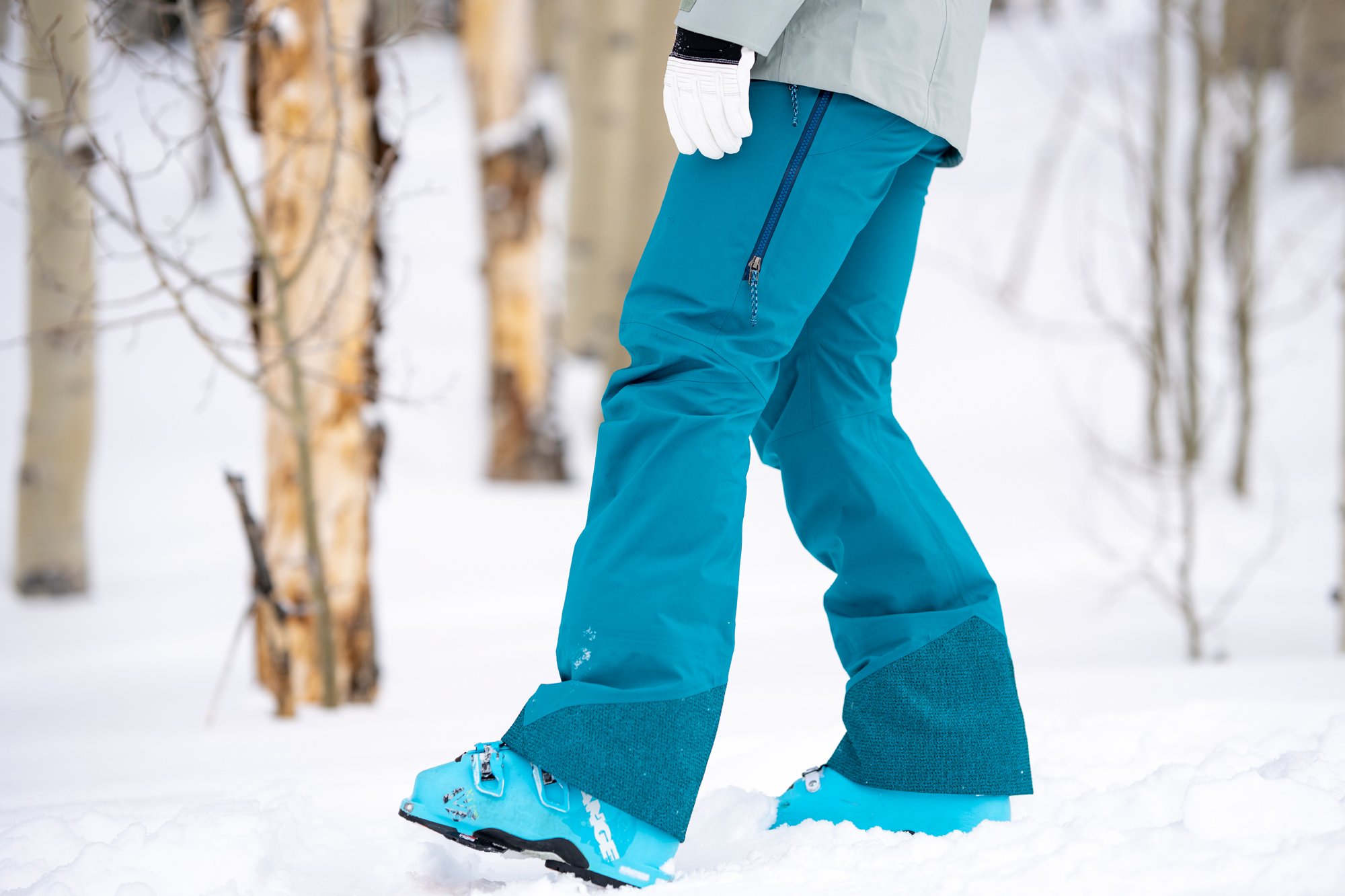From first chair to après, ski pants are essential for staying warm and embracing style. Women’s ski pants are also your best friend all snow season, from running errands around town to sledding, shoveling, and walking the dog.
Women’s ski pants must fit well, move well with zero restriction, and work year after year. We’ve found the most standout options, from smart, functional pockets to leg vents and adequate waterproofing.
For a non-insulated ski pant that serves you on sunny days or wild winter storms, don’t overlook the queen Rab Women’s Khroma Diffuse GORE-TEX Pants, at a mid-tier cost. For a nicely articulated but basic build at half the price, look at The North Face Women’s Freedom Insulated Pants, which focus on insulation over blizzard-worthy windproofing, waterproofing, and breathability.
Editor’s Note: We updated our Women’s Ski Pants buyer’s guide on October 15, 2025, with the field-tested and award-winning Stio Women’s Environ and Patagonia Women’s PowSlayer. We added an extended rating system that includes Weather Protection, Fit and Mobility, Durability and Construction Quality, plus Breathability and Ventilation. Read about it in our Women’s Ski Pants Rating System.
The Best Women’s Ski Pants of 2025-2026
Best Overall Women’s Ski Pants
9.5/10 Rating
Best Budget Women’s Ski Pants
6.5/10 Rating
Best Backcountry Women’s Ski Pants
9/10 Rating
Best Women’s Ski Pants for Curvy Figure
7.5/10 Rating
Best Women’s Ski Pants Short Length
8.5/10 Rating
Best Insulated Women’s Ski Pants for Extreme Cold
7/10 Rating
Best Lightweight Women’s Ski Pants
8/10 Rating
See more picks
-
Soft, durable fabric -
Belt loops or external integrated velcro belt to cinch waist -
Functional pockets
-
Not the most quiet material -
Top-shelf investment
-
Baggy yet feminine shape for ultimate comfort and aesthetic -
So many pockets! -
Lightly, strategically insulated with interior leg vents is the perfect combo -
Excellent price
-
Internal hang loop is small and inflexible, making it hard to hang dry pants off larger hooks -
Hand pockets have fleece liner above digits — we’d like that material on the hand’s underside -
10K waterproofing might not provide long-term or enough protection for heavy coastal storms
-
Large bellowed thigh pockets are roomy (and fit a large phone) -
Robust reinforced hems -
Supremely articulated fabric around hips and glutes for freedom of movement -
Feels very lightweight
-
Hard to keep stains out of the light colored fabric -
Expensive -
Light-feeling fabric does not block cold wind well — wear a heavier base layer on blustery days
-
Extremely comfortable for freezing days thanks to the insulation -
Innovative cinch for hem stowaway (accessed via hand pockets) -
Super comfortable and stylish -
Circular polyester’s upcycled fabrics avoid landfill
-
At 770 g, the pants might feel a tad heavier than other pairs -
Insulation could be too much on super sunny, warm spring days -
High-reaching waistband might not be everyone’s choice style
-
Excellent fit, articulation, and shape -
Functional, spacious, well-placed pockets -
Comfortable, adaptive waistband
-
Only three pockets might be a drawback -
Not your baggy freeride option
-
Fleece-lined pockets -
Thigh vents -
PFC-free DWR and 100% recycled face fabric and liner
-
Insulated pants might not be everyone’s top choice -
Not the most windproof
-
ePE GORE-TEX fabric is PFAS-free -
Flannel-lined for light insulation -
RECCO included -
Anti-odor treatment
-
No mesh backer on the side vents
Other Women’s Ski Pants We Love
-
Eco-friendly recycled fabrics -
Body-mapped insulation that adds warmth without extra bulk -
Plenty of pockets
-
Some may find the pants run big
-
Reliable warmth in frigid temps -
Nice-to-have features like thigh venting and boot-strap slots -
Approachable price for most resort skiers
-
Not enough pockets -
Too warm for uphill or active pursuits
-
Affordable for a 3-layer waterproof pant -
Relaxed fit through the legs for unrestricted movement -
Solid weatherproofing for storm days or slushy spring laps
-
Sizing is tricky -
No RECCO
-
Waist-to-thigh, double-zipper open exterior ventilation -
Dedicated beacon pocket with a leash -
Wide, reinforced cuffs with flexible gaiters
-
No belt loops for added cinching at the waist -
No mesh backing for ventilation, which could let moisture in
-
Plenty of warmth for frigid ski days -
Adjustable waist and leg cuffs -
Huge range of sizes to fit all body types
-
No ventilation -
Classic styling is a bit off-trend
-
Warm -
Stylish -
Embedded RECCO reflector
-
Too warm for uphill travel
-
Reinforced hems and interior leg with tenacious CORDURA -
Economic price
-
No zipper on the extra thigh pockets; only Velcro flaps -
Not much give in the waistband, so consider sizing up
-
Large waist velcro strap for fit adjustment -
Cordura scuff guards reinforce the cuffs
-
No short inseam options -
Two inner-thigh vents without mesh backing can invite moisture in -
Seemed to run big
-
Pockets are roomy and functional -
Belt loops or an integrated/interior velcro belt help secure waist -
Insulation keeps you cozy on lift rides and gusty days
-
Insulation could be too much for warmer and spring days -
Zippered vents are a tad short and on exterior leg (some prefer interior placement)
-
Breathable softshell fabric -
DWR treatment sheds wet snow
-
Seams not sealed -
Not the 3-layer pant you need for huge storms
-
Very well insulated to keep you warm on freezing, blizzardy, and windy ski lift rides -
Zippered, gusseted hems -
Stylish
-
The interior ventilation zippers are a bit stunted in length
-
Belt loops -
Soft, lightweight lining for extra comfort
-
Only two standard hand pockets -
Could be too much insulation on warmer days -
Straight cuff is a snug fit over ski boots -
Cuffs are not reinforced
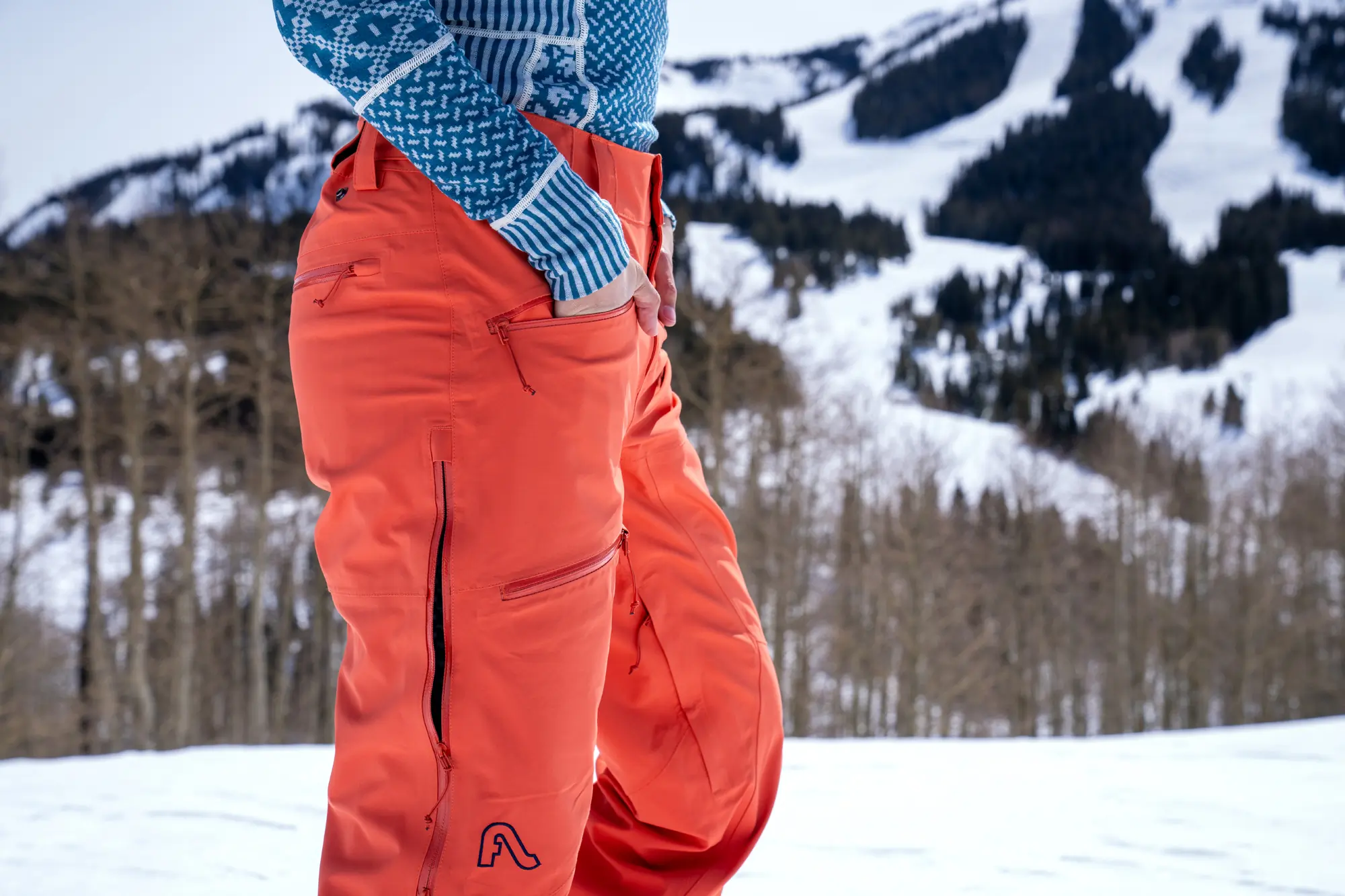


Women’s Ski Pants Comparison Chart
Scroll right to view all of the columns: Price, Shell, Insulation, Fit, RECCO.
| Women’s Ski Pants | Price | Shell | Insulation | Fit | RECCO |
| Rab Khroma Diffuse GORE-TEX | $450 | 3-layer GORE-TEX shell with 100% recycled face fabric | None | Regular, Tailored | No |
| 686 Aura Insulated Cargo | $190 | 2-Layer infiDRY 10K (100% polyester) with PFAS-free DWR | 40 g lightweight infiLOFT body-mapped in backside and knees | Baggy | No |
| Patagonia PowSlayer | $649 | 3-layer GORE-TEX Pro ePE | None | Relaxed | Yes |
| The North Face Freedom Insulated | $200 | 2-layer 100% recycled nylon with non-PFC DWR | Yes: The North Face Heatseeker | Regular | No |
| Halfdays Alessandra | $295 | 100% recycled polyester | Yes: PrimaLoft Black | Fitted, Athletic (but stretchy) | No |
| Helly Hansen Switch Cargo Insulated | $225 | 2-layer HellyTech Performance fabric with DWR finish | Yes: 40g PrimaLoft Black Eco | Regular, Tailored, Low-rise | Yes |
| Eddie Bauer Chair Six Shell | $229 | 3-layer 100% polyester treated with StormRepel Plus DWR | None | Standard, Straight | No |
| Picture Exa | $240 | 100% circular polyester | Yes: 40g Recycled Thermal STD | Regular, Straight, Baggy | No |
| Stio Environ | $429 | PeakProof 3-layer 100% recycled polyester 150-denier face fabric | None | Regular (not narrowly athletic, not baggy freeride) | No |
| Columbia Sportswear Cirque Bowl Insulated | $170 | 93% nylon and 7% elastane with Omni-Tech waterproof-breathable membrane | Yes: 60g Microtemp XF II synthetic insulation with 85% recycled polyester | Regular (slightly shorter and less baggy than a freeride fit) | No |
| Arc’teryx Sentinel | $600 | 3-layer nylon fabric with GORE-TEX | None | Standard | No |
| Mountain Hardwear Cloud Bank GORE-TEX | $375 | GORE-TEX ePE 2-layer | Body-mapped Insulation (60g in thighs, 40g in legs) | Relaxed | Yes |
| Outdoor Research Snowcrew | $229 | Ventia 2-Layer 100% polyester (56% recycled), 75D × 150D | VerticalX Eco synthetic insulation 45 g/m², 85% recycled polyester | Standard | Yes |
| Columbia Sportswear Platinum Peak II 3L | $250 | 3-layer Stretch, made from 100% recycled polyester | None | Relaxed | No |
| La Sportiva Excelsior | $57 | Midweight soft shell | None | Athletic, Stretchy | No |
| Helly Hansen Powderqueen | $310 | 2-layer certified bluesign proprietary fabric | Yes: Recycled 40g PrimaLoft Black Eco | Freeride, Baggier | Yes |
| Black Diamond Recon LT Stretch | $350 | BD.dry 3-layer face fabric treated with a DWR | None | Regular | Yes |
| Marmot GORE-TEX Lightray | $325 | 3-layer GORE-TEX shell with 100% recycled face fabric | Yes: 40g PrimaLoft Black Eco | Regular | Yes |
| Helly Hansen Alphelia Infinity 2.0 | $310 | 3-layer GORE-TEX shell with 100% recycled face fabric | Yes: 80g PrimaLoft Black Eco | Regular-to-Slim | No |


How We Tested the Best Women’s Ski Pants
The GearJunkie team consists of alpine and backcountry skiers testing women’s ski pants in-bounds and hut-to-hut all over North America. Since this guide was first published in 2020, we’ve updated it eight times.
Our Expert Testers
GearJunkie Snowsports Senior Editor Morgan Tilton has more than 30 years of snow pant experience as a lifelong skier and snowboarder. Gear tester Heather Balogh Rochfort is a writer and editor based outside of Aspen, Colo. Contributing gear tester Kaylee Walden is an American Mountain Guides Association (AMGA) Advanced Ski Guide and avalanche course instructor. Contributors Mary Murphy and Jessi Hackett are skiers based in Colorado.


Our Testing Grounds
Our testing has included bell-to-bell resort powder days, ski-to-surf trips on Vancouver Island and in California, and backcountry hut adventures.
Tilton is based in Crested Butte, Colo., one of the coldest, windiest, snowiest places possible for ski gear testing. She tests apparel on ski trips across North America including Montana, Wyoming, and British Columbia. Walden is based in Southwest Colorado and goes home to Montana each winter, too.
Hackett works and plays in Colorado’s Roaring Fork Valley. She tests ski pants at Aspen Snowmass, in local SkiMo races, during sunrise and moonlit skins, laps in Highland Bowl, and top-to-bottom turns on Aspen Mountain. Off-piste, she Nordic skis or ski tours in the surrounding Elk Mountains.
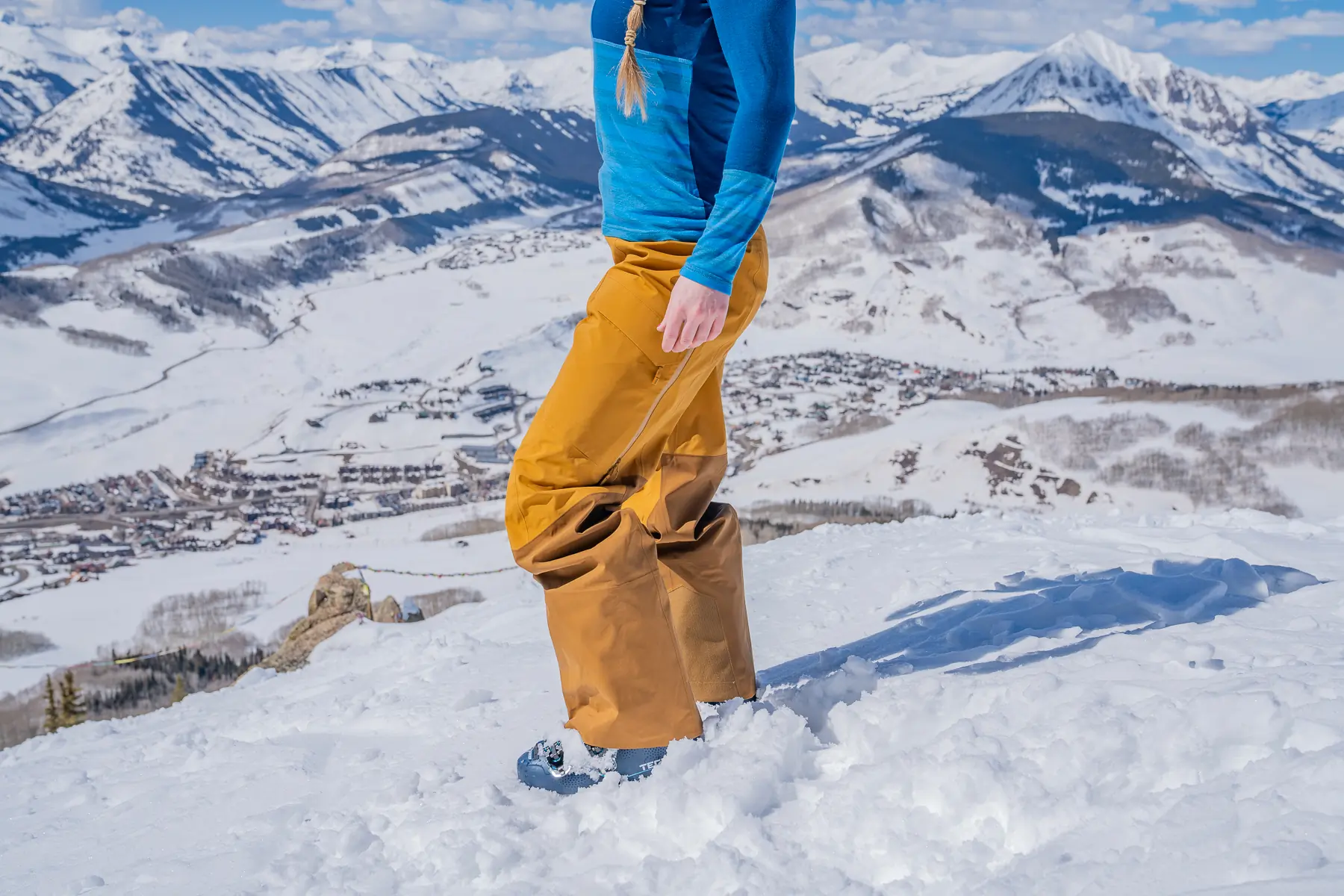



Our Testing Process
We test ski pants while skiing and ski touring in sub-zero temperatures, blizzards, blustery wind, intense sun, and even rain.
While testing women’s ski pants, we assess the durability, material, overall fit, ease of movement, density, protection against the elements (including waterproofness, windproofness, and insulation) fabric feel, breathability, ventilation, and functionality. We look at specific details, including the pocket size, quantity, function, and placement, as well as the zippers, zipper pulls, vents, gaiters, waistband, belt loops, and cuff.
When we examine ski pants, we also consider the size range, including the inseam lengths. We do groundwork, research, and interviews to find and test the most innovative, sustainable, legacy, popular, and bestselling women’s ski pants on the market. These ski pants represent a broad range of price points and designs for a variety of applications and needs.
Our Women’s Ski Pants Rating System
We score each pair of women’s ski pants on a 1–10 scale for Weather Protection, Fit and Mobility, Durability and Construction Quality, plus Breathability and Ventilation.
While considering weather protection, we take into account how the pants shield moisture, wind, and cold. Fit and mobility examines how effortlessly the pants move with us while going uphill, downhill, sitting, and bending over, as well as if there are any snag points. We pay particular attention to the zones around the thighs, hips, and midriff, as well as how seamlessly the pants slide over the top of our boots. Durability and construction quality considers the overall material, stitching, hems, waistband, zippers, and pockets. The breathability and ventilation takes a look at how effectively the design releases moisture and heat during high-output activity, including the material and mechanical vents.
The Overall Rating is based on contextual, editorial judgment, and the complex user experience across various scenarios and conditions.
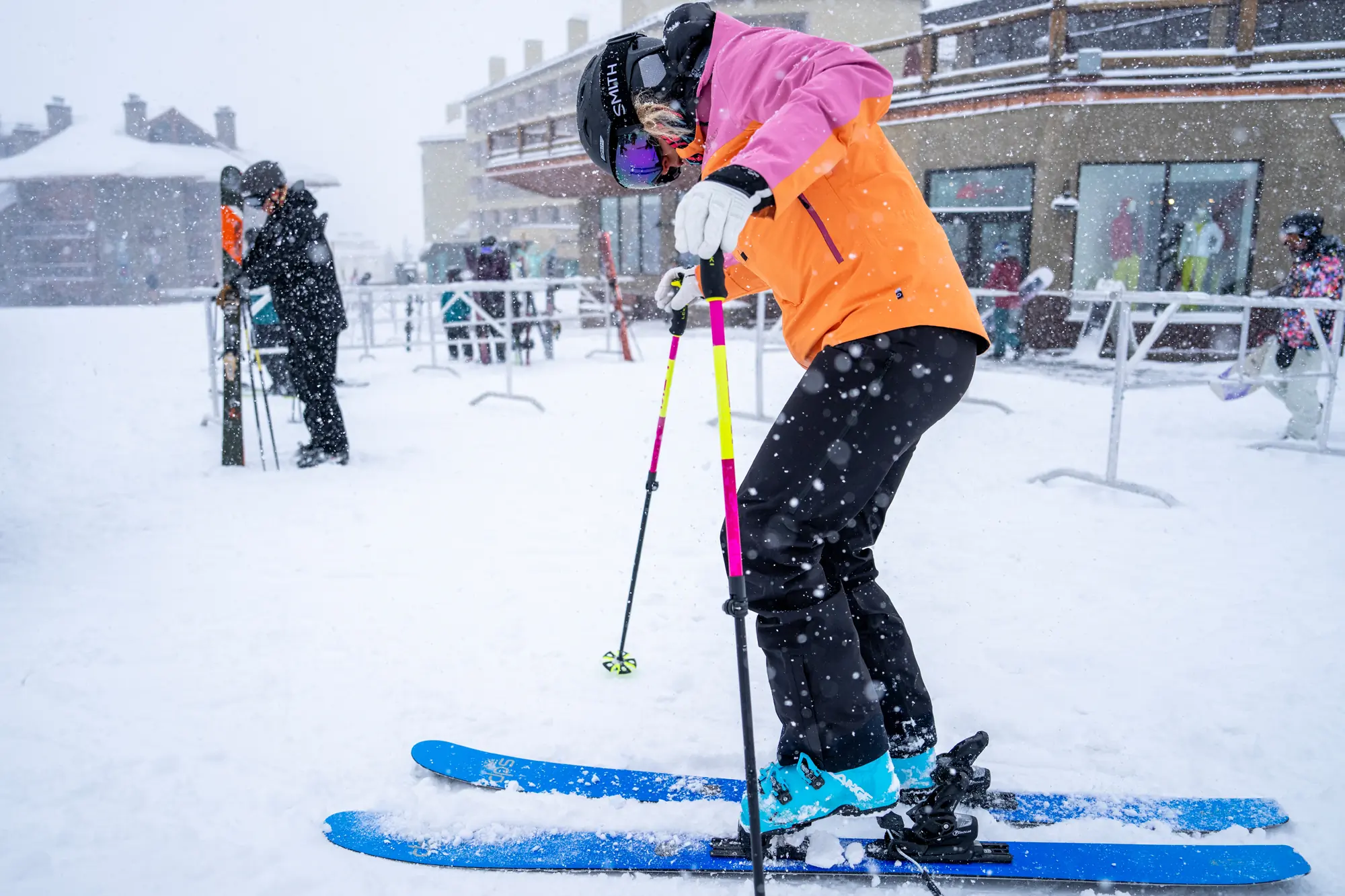



Buyer’s Guide: How to Choose the Best Women’s Ski Pants
Snow pants aren’t hard to find, but finding the right pair can be harder than you think. Designs for winter sports like backcountry or downhill skiing each have different details, fit, and style that make those pants more comfortable and functional.
Many women’s ski pants work splendidly for a range of other winter activities, from sledding to shoveling or fat biking and ice skating — you name it.
Of course, the available size and inseam range will also play a huge role in which ski pants you’ll choose.
Insulated versus Non-insulated
You’ll want to decide if you need insulated ski pants or non-insulated women’s ski pants.
We prefer insulated snow pants for days at the ski resort that are in the teens or less and windchill. If we’re backcountry skiing or downhill skiing when it’s warm and sunny, we definitely only need a basic shell that’s not insulated.
Get What You Need: Weather Protection
From that point, you can spend more on ski pants that are more waterproof and breathable, which we recommend for Pacific Northwesterners or zones that get heavy or wet snowstorms you plan to ski bell-to-bell in.


Waterproofing & Breathability
Two-layer and three-layer fabrics have different weights, waterproofness, and breathability ratings. Three-layer textiles are generally the benchmark of weather protection, offering more waterproofness and windproofness.
For powder days, riding lifts during a snowstorm, or while skiing in a wet snow climate, it makes sense to invest in a fully waterproof fabric that has a GORE-TEX membrane or a similar integrated layer of protection sandwiched inside that 3-layer design. Otherwise, pants can be water resistant: The face fabric is treated with DWR, which repels water but wears off over time and needs to be reapplied. DWR can also be applied to 3-layer waterproof layers to further enhance protection.
Climate and Weather
The climate where you ski is an important variable for selecting the appropriate waterproofness. There are three snowpack climates:
- Maritime: Closer to the ocean, has higher water content, and the snow is wetter, such as in coastal B.C., Alaska, or Washington
- Intermountain
- Continental: Lower humidity, more sun, and typically colder temperatures, like in Colorado, which typically has less water content and is generally much dryer and sunnier
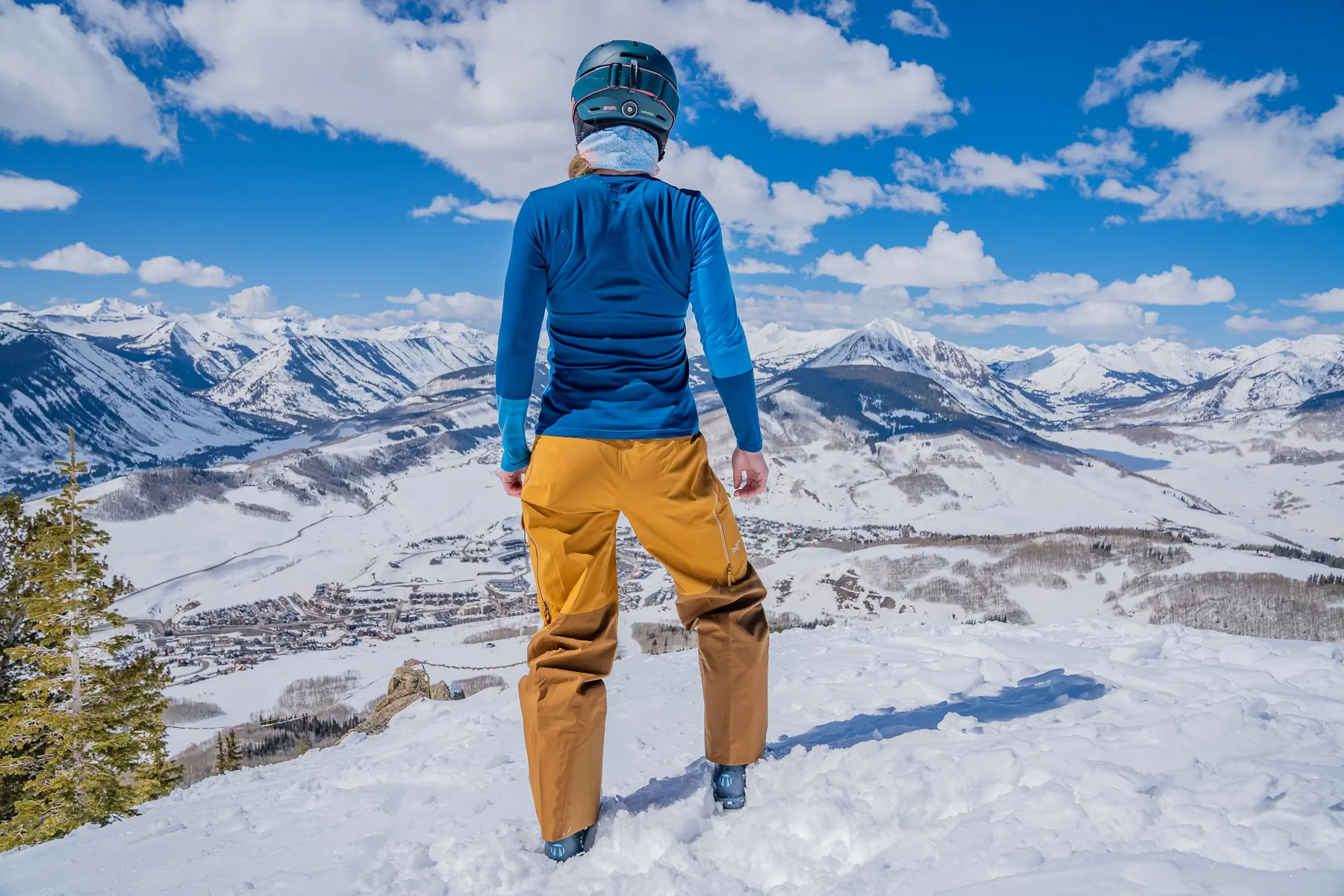



Waterproofness
Waterproofness is often measured by millimeters, based on the amount of water a 1-inch diameter of fabric can withstand over 24 hours before being soaked. So, 5,000 mm would suggest resistance to light rain or dry snow, whereas anything greater than 20,000 mm would imply waterproofing in heavy rain and dense, wet snow. Our picks for a wetter climate would be a more waterproof hardshell GORE-TEX pant, like the Arc’teryx Sentinel.
Breathability
Breathability is the fabric’s ability to encourage perspiration and excess heat to move through it to equalize temperature. With more breathability, you inevitably sacrifice some waterproofing capability and protection from the wind. Breathable fabrics, like DWR-coated softshells, are ideal for backcountry skiing in dry climates where the snow isn’t as wet. Pants like the La Sportiva Excelsior softshell have maximum breathability, for instance.
The metric for breathability is based on how many grams of moisture can pass through the inside to the outside of a square meter of fabric in 24 hours. For high-output days on the slopes, pants with breathability of 10,000-15,000 g do the trick. Backcountry skiers and uphill athletes will need to expel more water vapor through the fabric and should aim for 20,000 g or more.
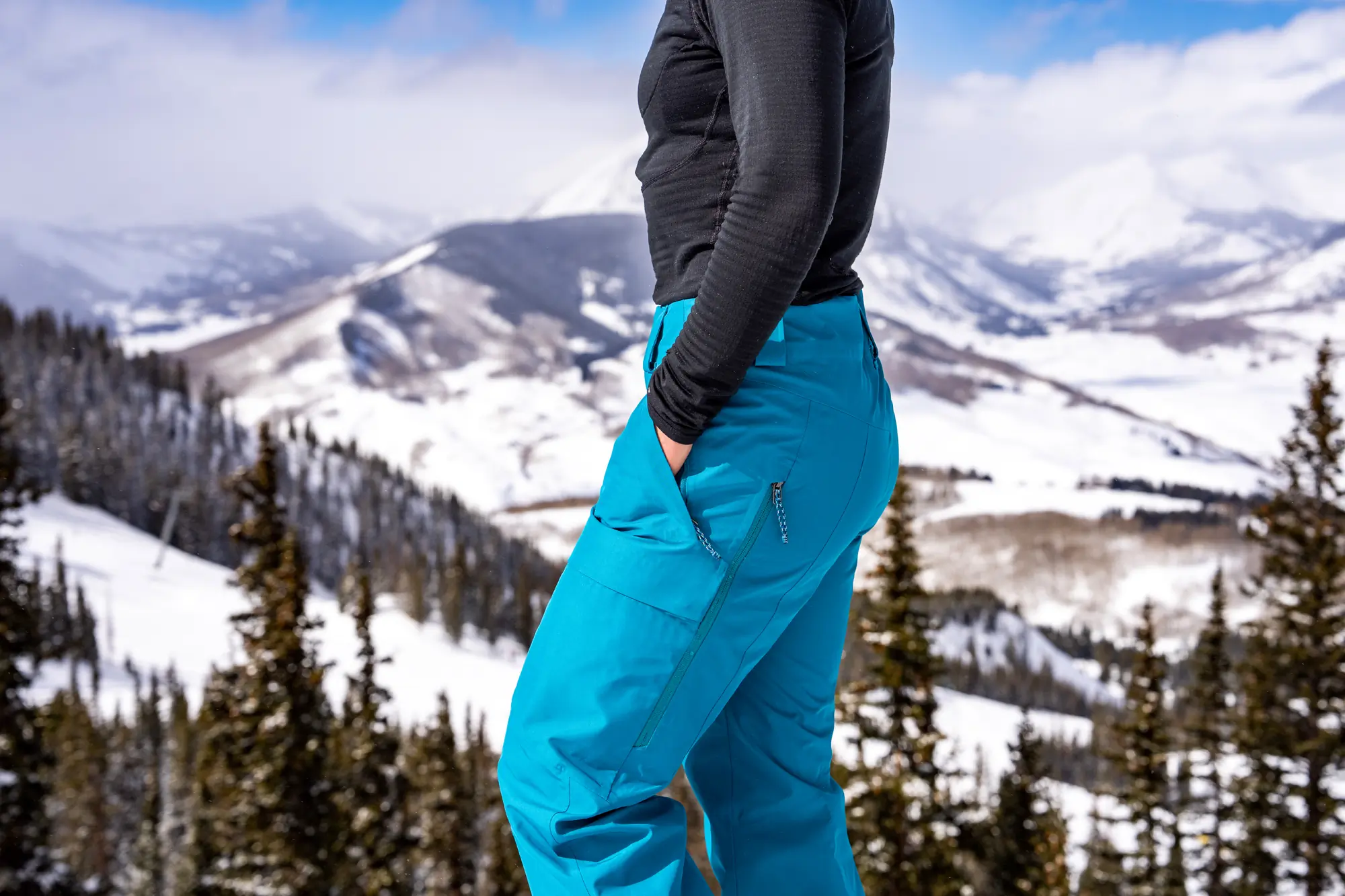



Breathability can also be measured using the Thermal Evaporative Resistance (RET) coefficient measuring a fabric’s ability to stop water vapor from getting through. The lower the number, the more breathable the fabric.
Here’s how the waterproofness and breathability compare across our favorite women’s ski pants:
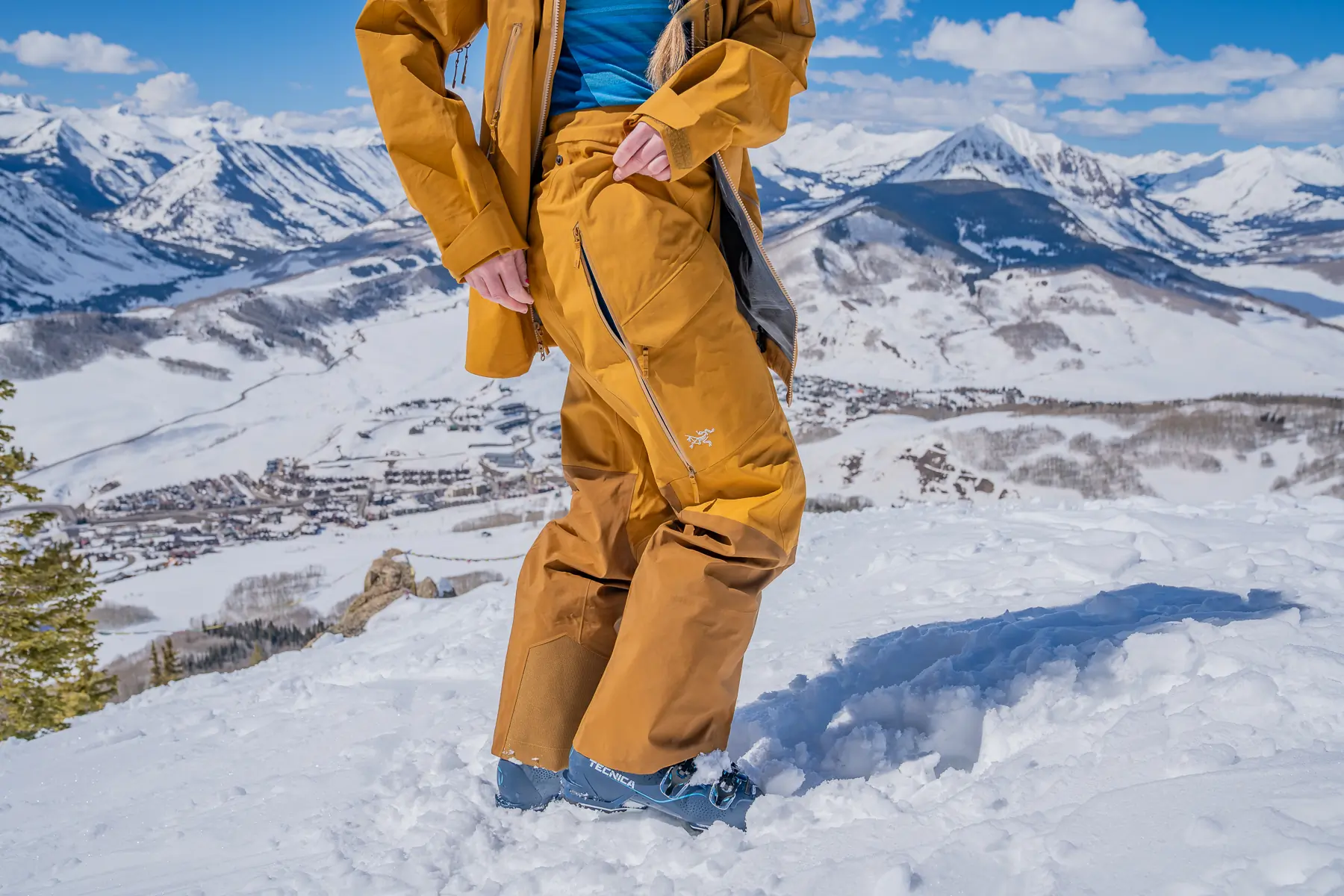



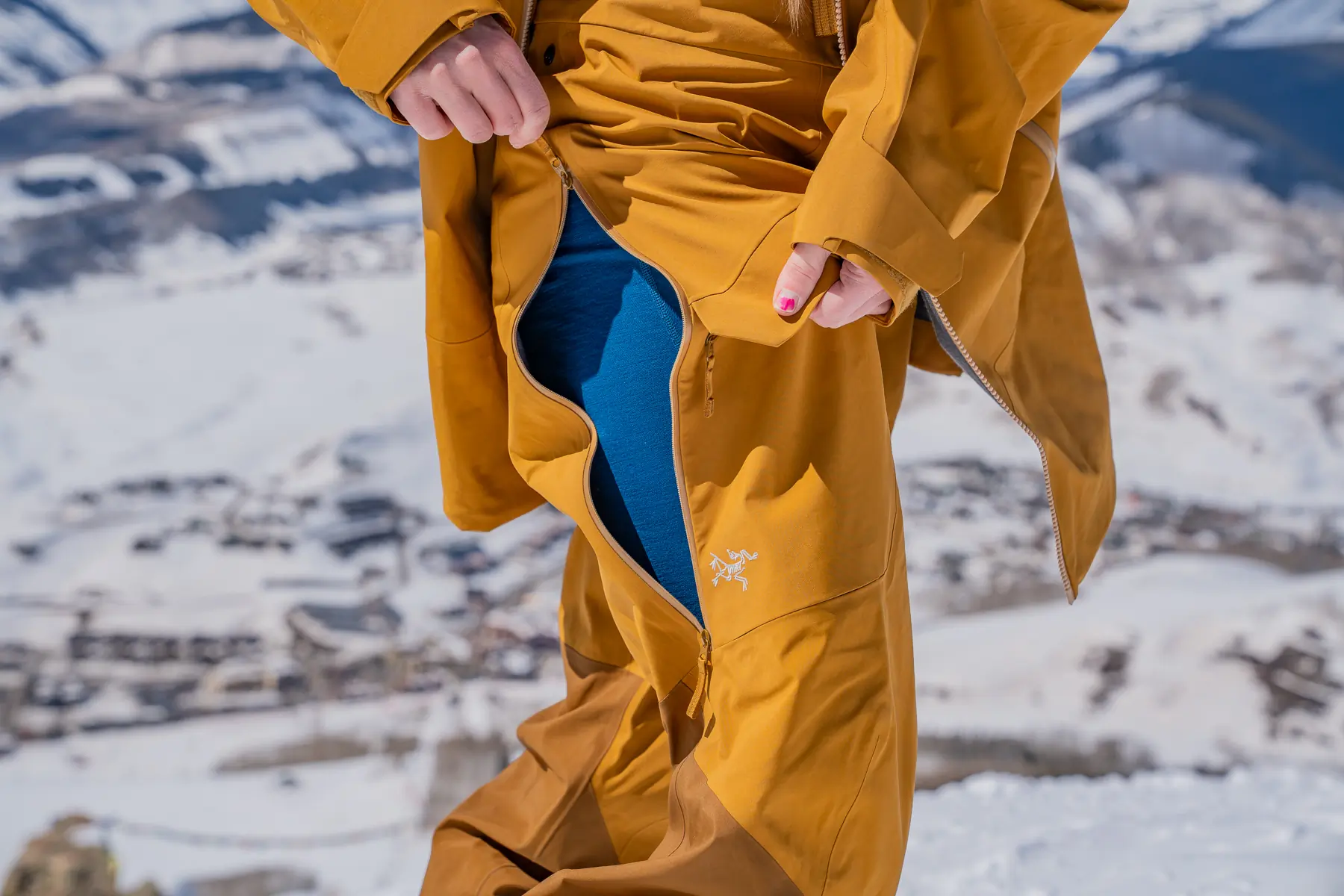



Leg Vents
Most of our favorite ski pants have leg ventilation. When you ski from one season’s end to the next, chances are you’ll face a wide temperature swing, so it’s great to have the option to vent. That said, not all ski pants inherently have vents, so if it’s important to you, double-check.
Usually, the zippers are located along the interior thigh, and you simply tug the zipper pull to open each one. Vents can also be located on the external side of the legs. Some have a layer of mesh inside, while others are open to your leg. The length of the vent varies widely from pant to pant.
For instance, the interior leg vents on the Rab Women’s Khroma Diffuse GORE-TEX Pants are a whopping 9.5 inches in length: This is great for backcountry skiing, when you’re working up a sweat on the climb. The Arc’teryx Sentinel Pant is 14 inches long, lacks a mesh insert, and is located on the exterior leg. On the other hand, the insulated Halfdays Alessandra Pant has 6-inch-long vents that are very slender, so those pants are really made for the heart of cold temps.
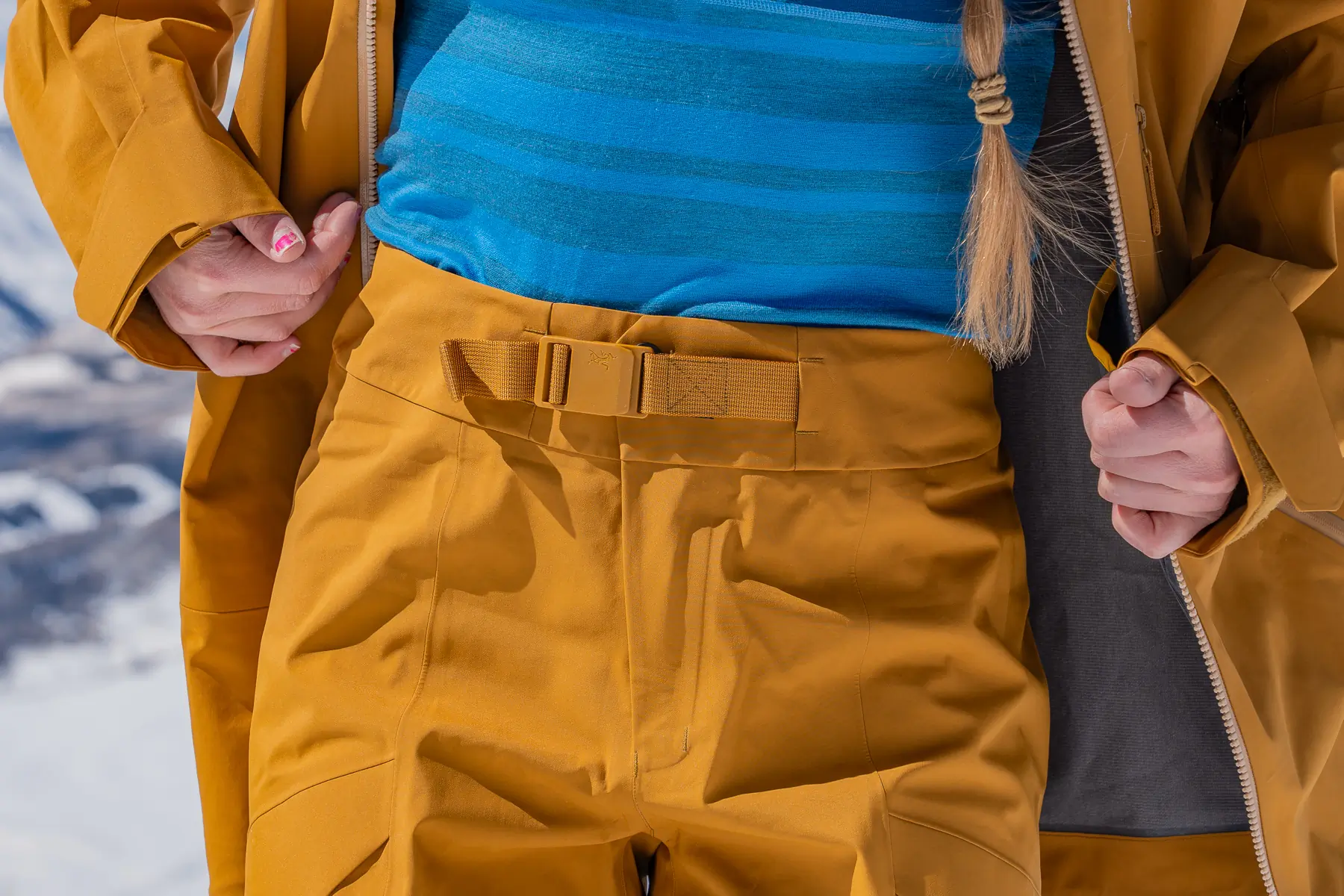



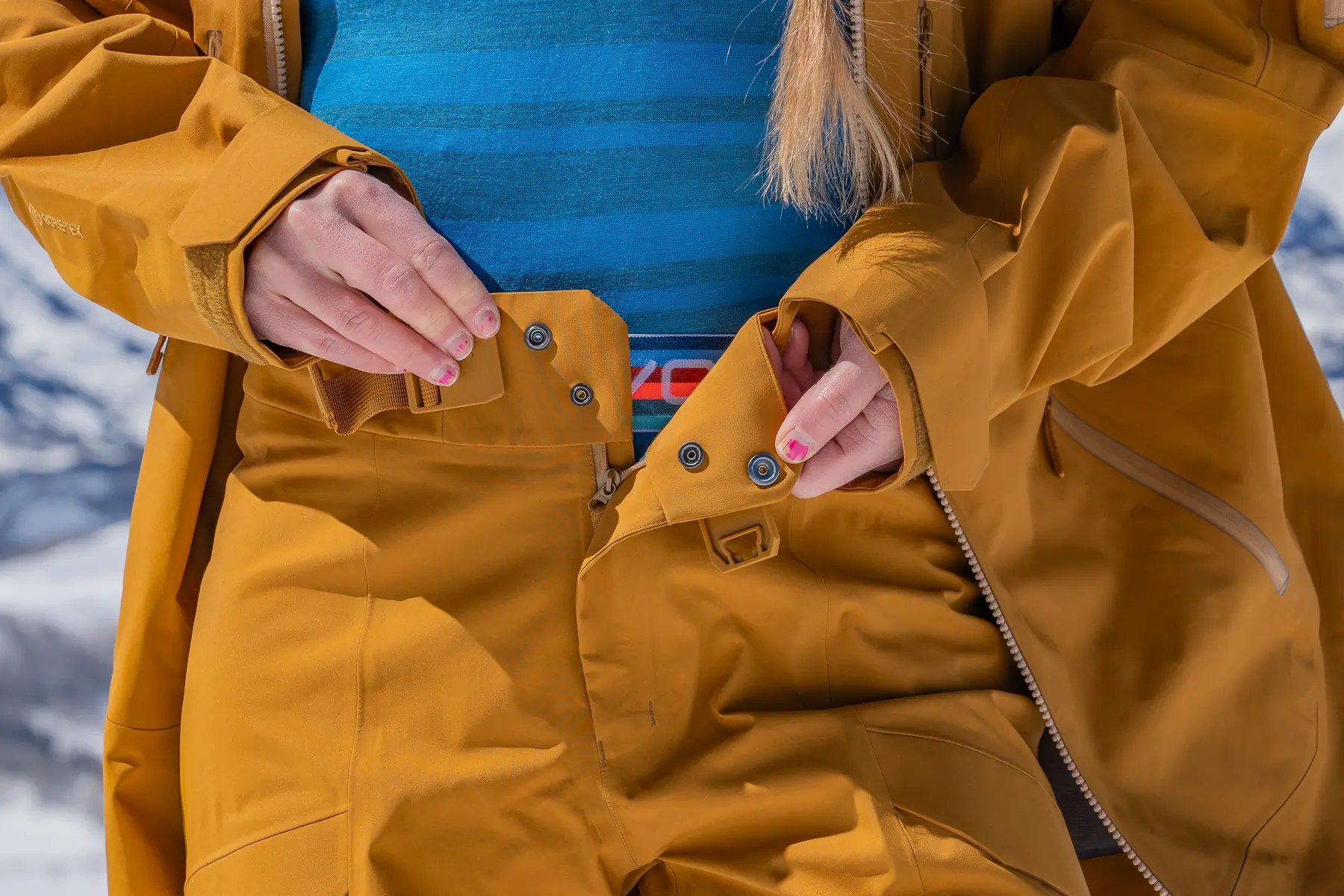



Fit & Waist
Ski pants can range between four general fits:
- Baggier freeride silhouettes
- Slightly relaxed, regular, middle-of-the-road fit
- Slightly trimmer, more athletic fit
- Performance, hugging fit; usually, this material is very stretchy or a softshell
The most form-fitting ski pants we have on this list is the La Sportiva Women’s Excelsior Pant, and Halfdays Alessandra Pant is likewise rather trim and form-hugging. A relaxed but still athletic silhouette would be the Arc’teryx Sentinel Pant. On the baggier end, we really like the Helly Hansen Women’s Powderqueen Ski Pants.
While fit is a personal preference, a slightly more streamlined fit is often more comfortable and ergonomic for skinning uphill as well as activities like fat biking. But if you want an unencumbered range of motion, maybe go with a relaxed fit. If you run cold and wear more or thicker base layers, consider an insulated pant or sizing up — but always check the size charts, because sizing varies from one brand to the next.
Most of the ski pants on our list have a snap closure and zipper fly, plus an adjustable waist like a velcro belt or integrated elastic belt. But you may find that pants that sit at the waist aren’t what you want on the slopes or that you’d like more coverage, in which case, Women’s Ski Bibs may be a better option.
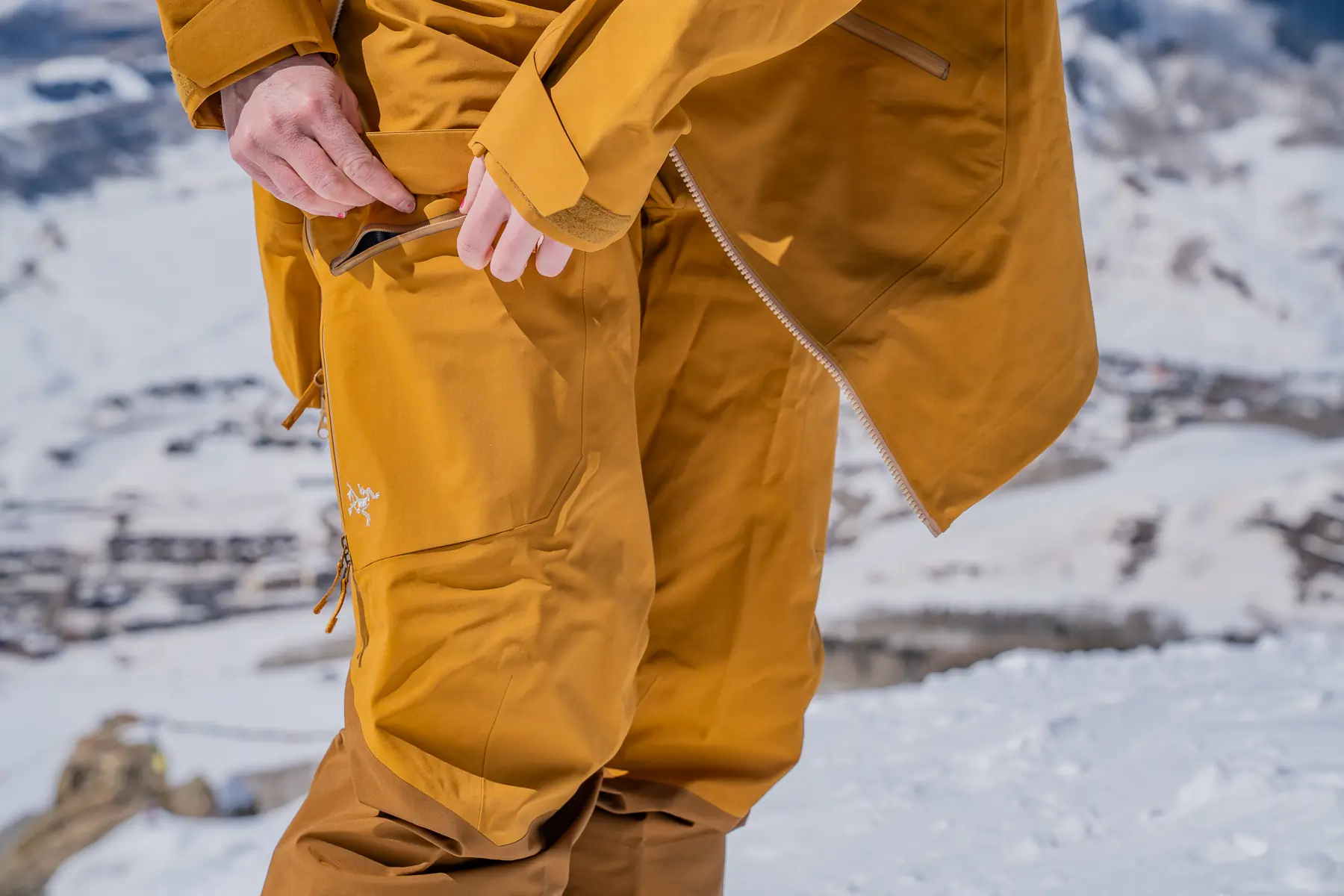



Ski Pant Pockets
Pockets are a must-have on ski pants: They need to be functional, deep, wide, and easy to open and close. The majority of our favorite ski pants have two traditional hand pockets, which have angled access. Some pants, like the North Face Women’s Freedom Insulated Pants, feature fleece-lined hip pockets to quickly warm up your hands.
Other designs have one or two cargo pockets on a thigh, which have a top entrance. While some pockets have a fabric flap, which protects the zipper and adds style, it requires more time to access the pocket, which can be annoying if it’s cold and snowy outside. Among our choice ski pants, the Arc’teryx Sentinel and Helly Hansen Cargo Switch Pants have roomy, useful thigh pockets that are made with enough space to store a snack bar, cellphone, or other essentials.
Some thigh pockets are tall and deep enough to accommodate larger devices like a cellphone or even a backcountry beacon or avalanche transceiver for ski touring like the Black Diamond Recon Stretch LT. As backcountry-focused pants, the Recon has beacon-specific pockets on the thigh, making accessing a beacon easier, more secure, efficient, and safer.
There’s a trend of brands putting stretchy pockets inside the thigh pockets, which are intended to hold a cellphone. But in our experience, those elastic hammocks are frequently too small to slide our phone in and out easily, or our phone snags on the hem when we’re trying to use the pocket, blocking us from quickly putting our phone away when we’re on the go.
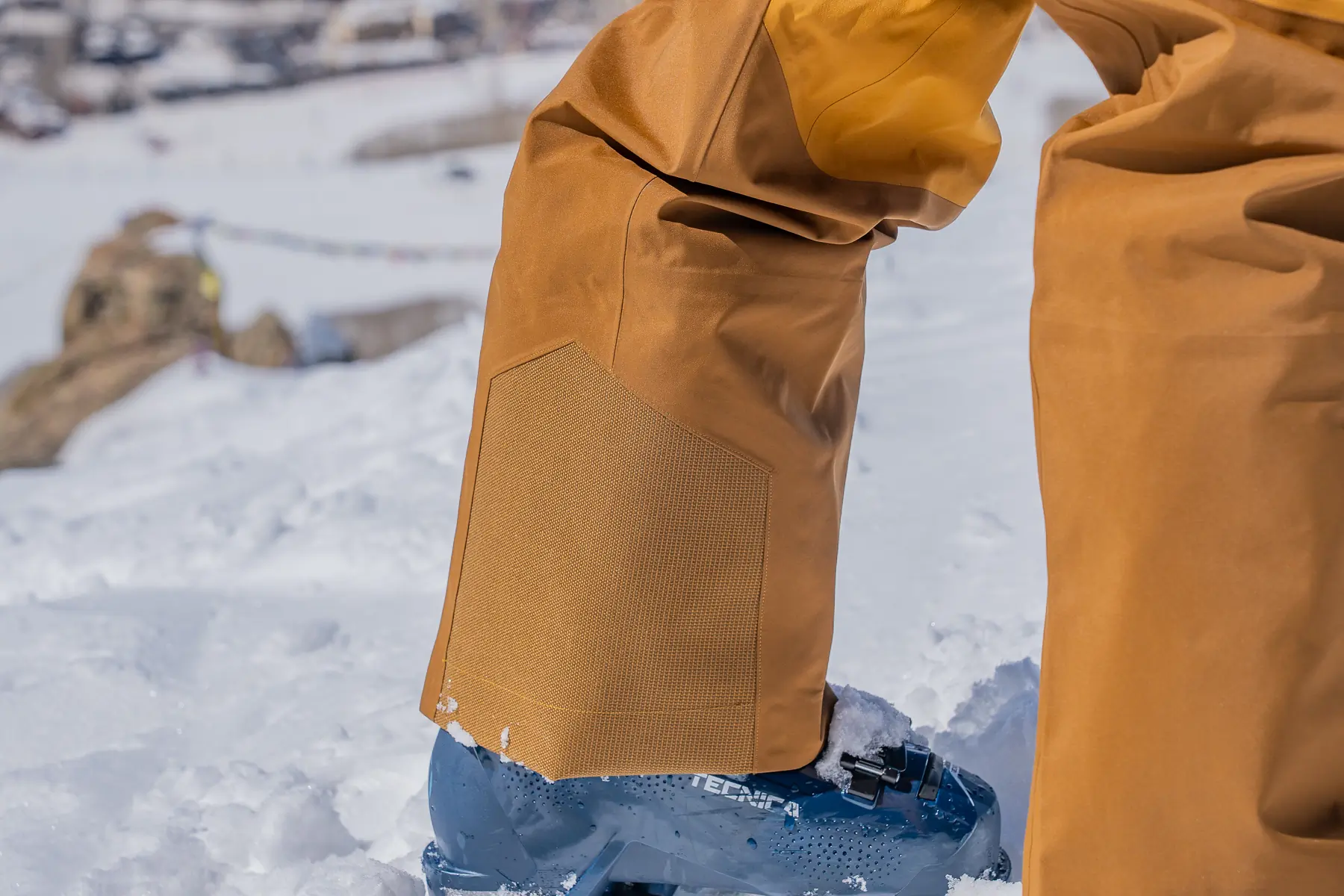



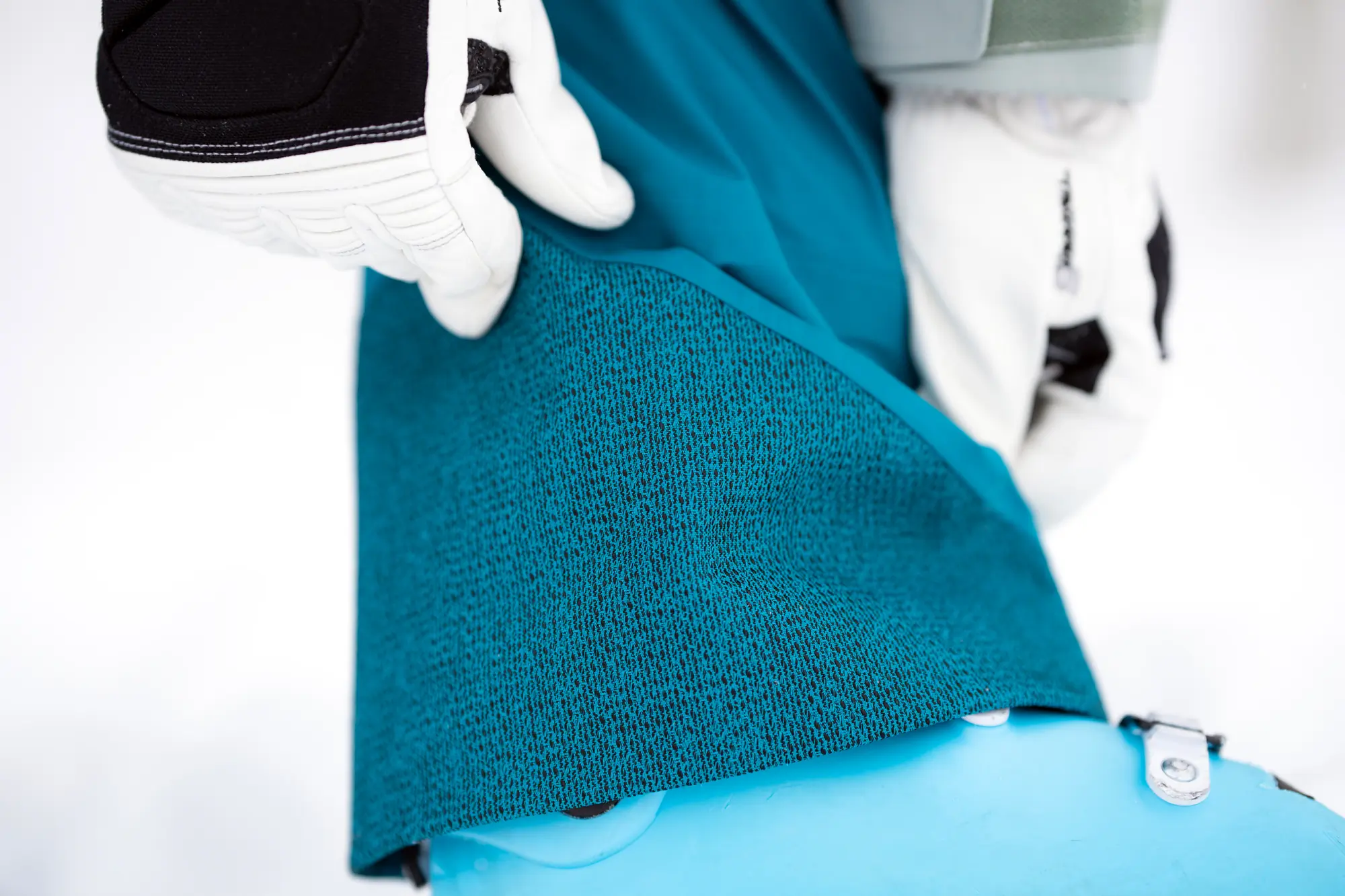



Reinforced Cuffs
The hem of your ski pants is more important than you think. Reinforced cuffs provide massive returns in durability by protecting the base of the pants from your ski boots, sharp ski edges, walking, or climbing in the backcountry. Sharp metal edges or crampons can easily slice into pant fabric.
To prevent cuts and tears that ruin your pants, most ski pants integrate kick patches or reinforced cuffs, which are made from a more robust material than the rest of the pants. One of the most common textile reinforcements is Cordura, which is an incredibly durable, abrasion-resistant synthetic material made from nylon.
Cordura ranges in weight and, at its most robust, is used for military-grade body armor. Gear like the Marmot GORE-TEX Lightray Pants will expertly integrate Cordura, making the fabric tough against abrasions while keeping a low profile. These patches are usually sewn along the interior hem and lower pant leg and can extend all the way to the top of your ski boots.
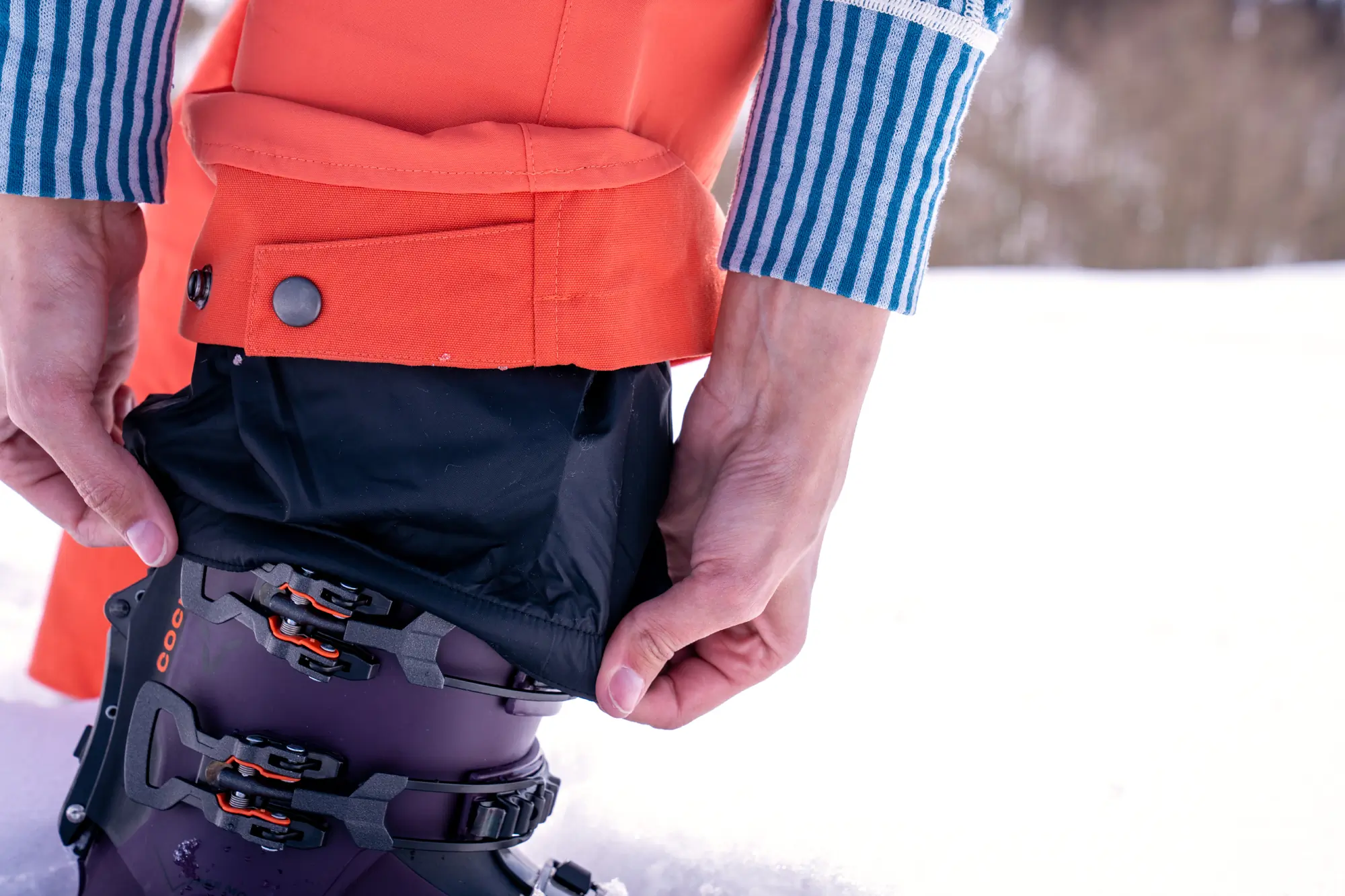



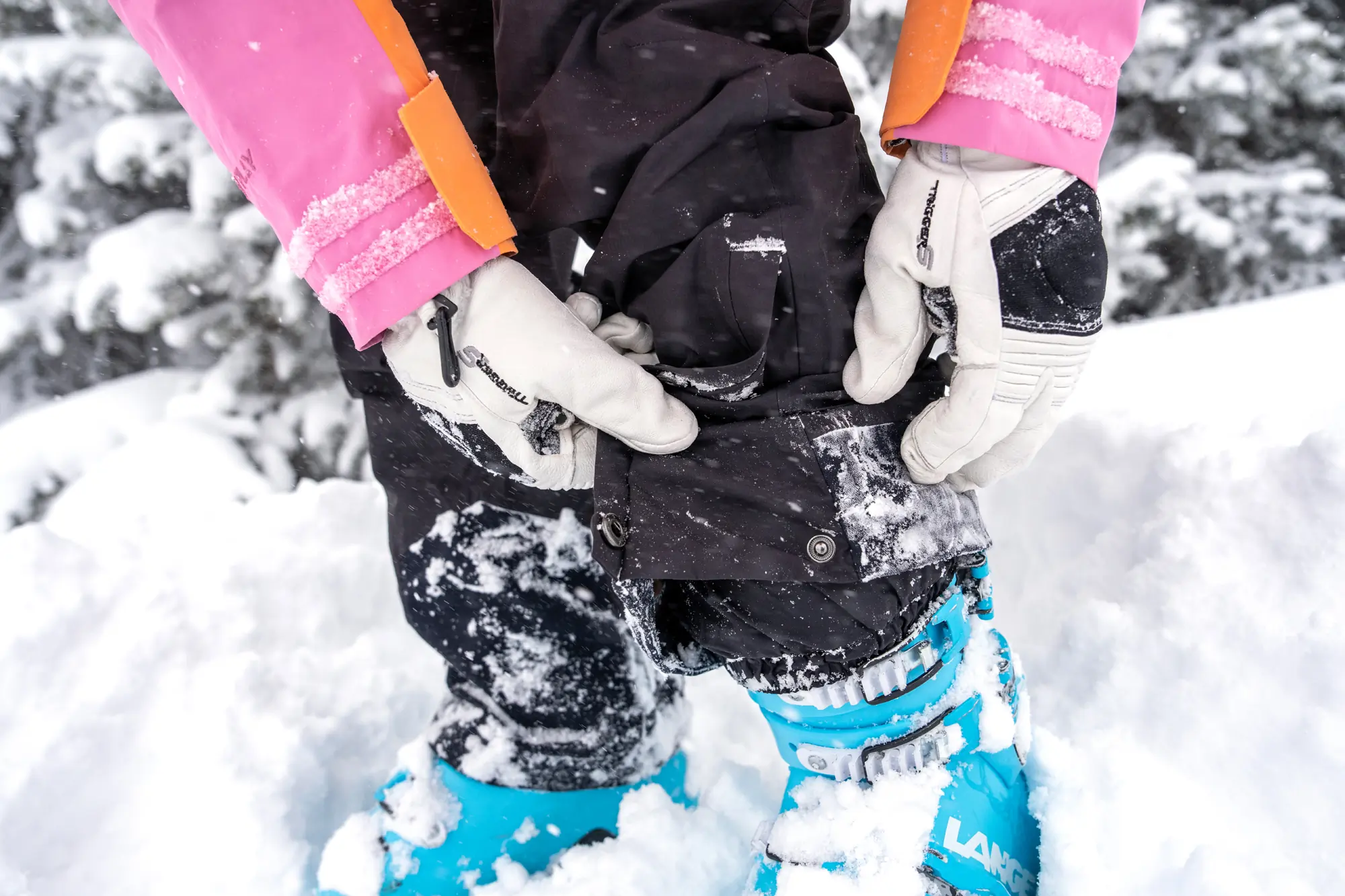



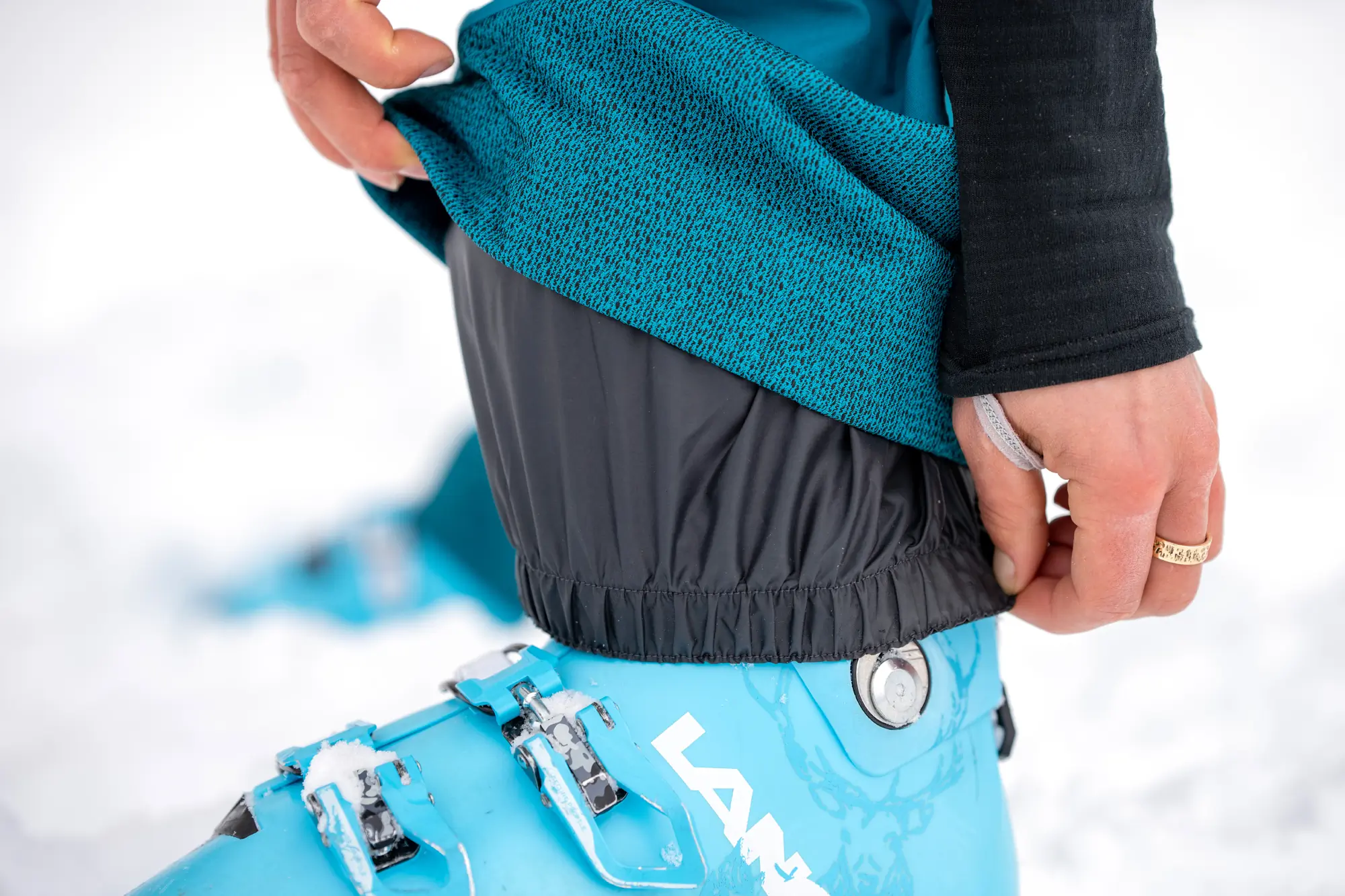



Gaiters
Integrated gaiters are a fairly standard feature on ski pants. When pulled down over your ski boots, they prevent snow from getting in at the cuff, especially when you’re bootpacking or on a powder day. Ski pant gaiters are integrated inside the pant, so they’re invisible from the outside. They’re made from nylon then finished with an elastic band, which keeps the bottom of the gaiter (and pants) cinched down around your boots.
Gaiters can also help block snow and ice from building up on the upper boot buckles, compression strap, BOA dial, or on some snowboard boots and laces.
We’ve noticed that the circumference of gaiters can vary from pant to pant, so don’t be surprised if some are snugger than others, especially with a boot that has a larger shaft circumference, like a snowboard boot.
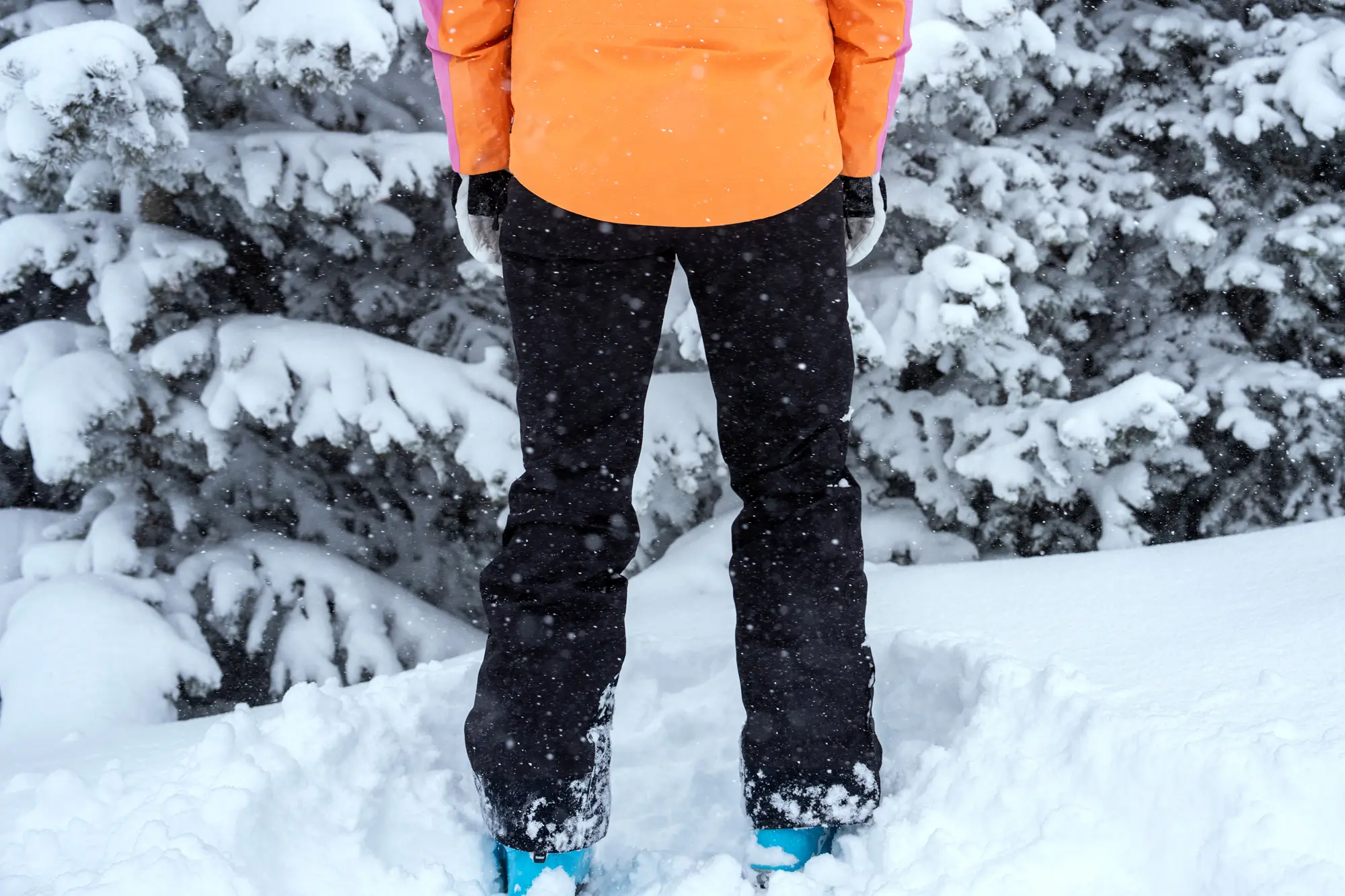



Fully Taped Seams
Fully taped seams may seem like a minor detail, but they’re an important design feature to look for in your ski pants. The name is self-explanatory: all of the seams on the pants are backed up with additional tape to increase waterproofing and wind protection so that the elements can’t sneak through any of the thousands of tiny holes where the pants are sewn.
Seam taping is an important feature of any waterproof gear, and you can find this manufacturing technique employed on everything from rain jackets to backpacking tents. Fully taped seams mean that every part of the garment is sealed so that you can expect superior waterproofing and protection.
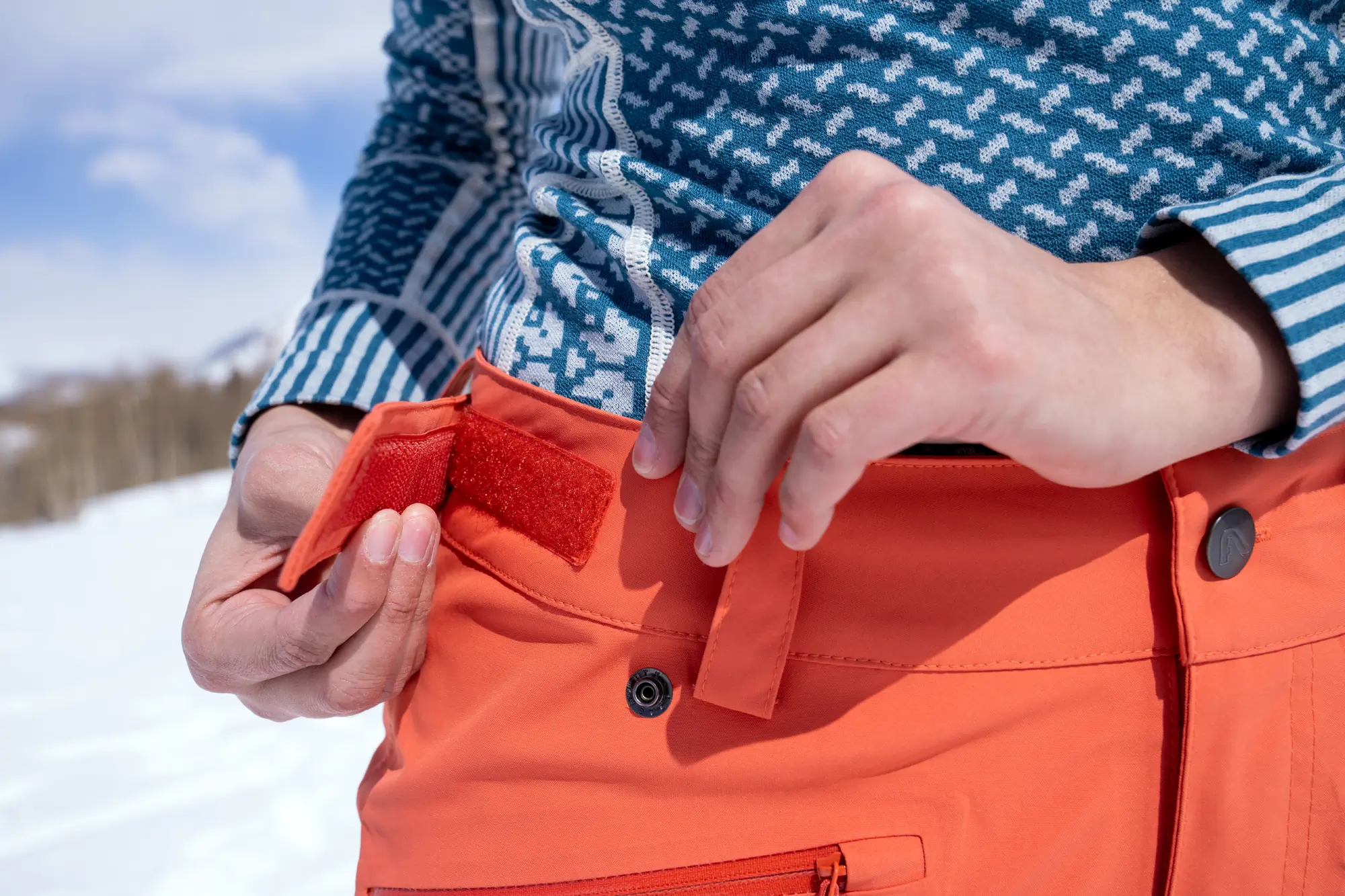



RECCO
An upgrade in ski pants is an integrated RECCO, a small reflective patch that consists of a diode and an antenna. The device is sewn into your ski pants and is used by search and rescue personnel to help find you in the event of an avalanche burial or getting lost.
Keep in mind that RECCO is not a replacement for an avalanche transceiver. RECCO reflectors are searchable beneath the snow — but only when used in conjunction with a professional radar detector (imagine a beam from a flashlight). When the signal hits the reflector, it bounces back to the rescuer, letting them know the location of a person in need. The range is a total of 80m by air (262 feet) or a 20m burial (65 feet) under snow.
If there is elevated avalanche hazard and you plan on riding steep terrain — especially in a place like the Alps where anything ungroomed is often not explosive mitigated — RECCO is a good additional piece to add to your gear to increase your chances of being found in the event of an accident. RECCO provides additional security for in-bounds use or near a ski area. Also, a reflector doesn’t age and doesn’t need activation.
These days, you’ll find RECCO in ski pants as well as ski jackets, ski boots, ski packs, and ski helmets.
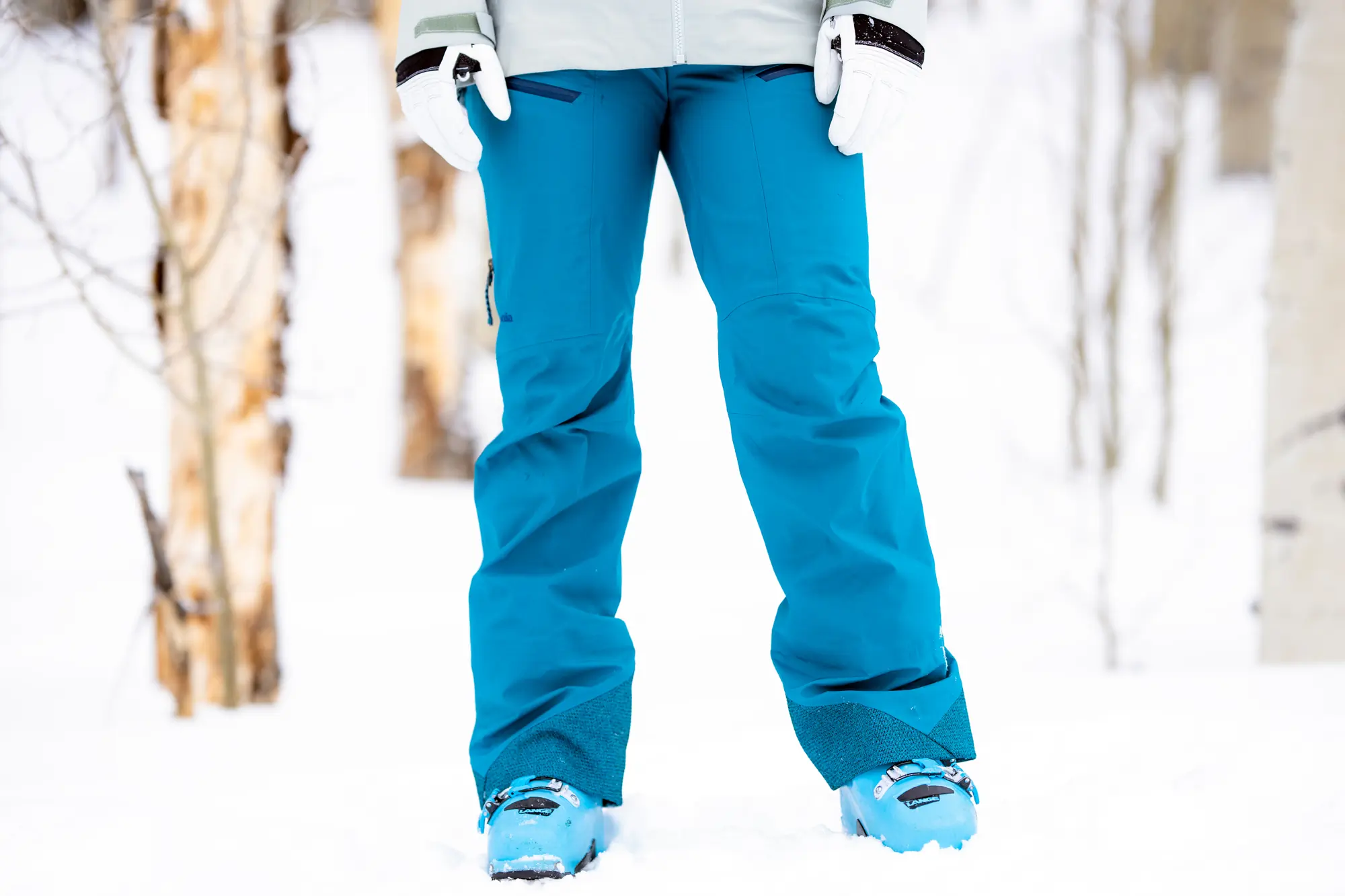



Sustainability
Third-Party Certifications
In the past, the ski industry hasn’t been the most environmentally friendly. But today, many brands are implementing new environmentally sound practices, such as utilizing Fair Trade-certified sewing, recycled materials, or toxic-free materials.
Recycled Insulation
Some insulated ski pants have proprietary insulation, like Flylow’s Greenloft, which is made from 100% recycled, post-consumer plastic. Halfdays Alessandra Pant is constructed with 100% recycled PrimaLoft insulation.
PFC-free DWR
Meanwhile, the Marmot GORE-TEX Lightray Pants and Helly Hansen Legendary Insulated Pants use PFC-free DWR treatments to lower chemical exposure.
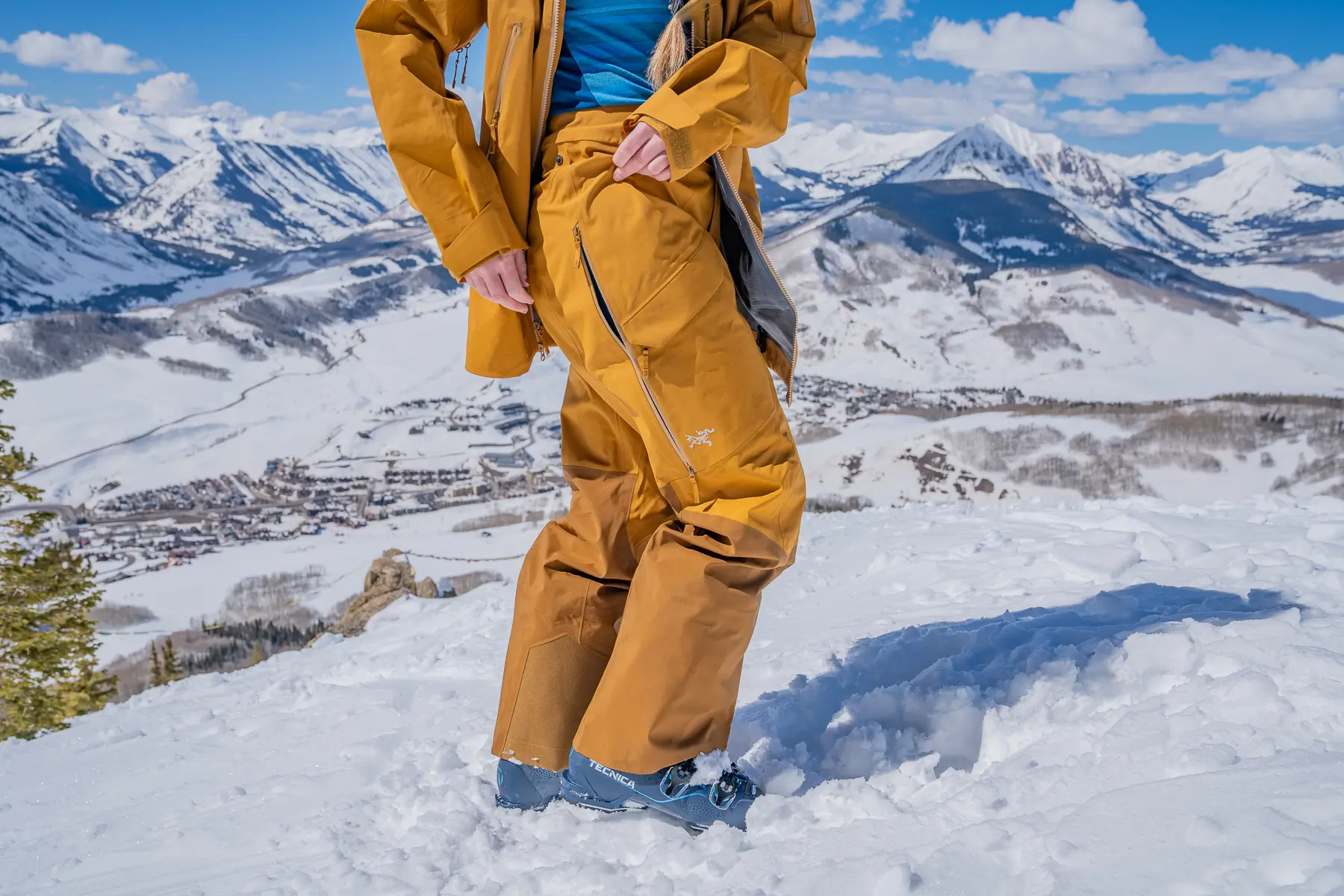



PFCs (Perfluorinated Compounds)
Patagonia led the charge with 2-layer and 3-layer ski apparel constructed without harmful PFCs — including the membrane, material, and topical treatment — with ePE GORE-TEX, which integrates 100% recycled materials.
Most recently, it launched the Patagonia Women’s PowSlayer Pants. But in 2022, Patagonia was the first to launch a GORE-TEX ePE 2-layer shell. In 2023, Patagonia debuted a 3-layer collection with GORE-TEX ePE.
Now, more brands are bringing winter apparel online with ePE fabric including the Mountain Hardwear Cloud Bank GORE-TEX Pants, Marmot GORE-TEX Lightray Pants and the Arc’teryx Sentinel Pant.
GORE-TEX ePE Fabric: What Is It?
GORE-TEX ePE membrane is a progressive waterproof, breathable material that’s very lightweight — it even feels a bit feathery compared to traditional textiles.
But, it’s extremely durable and made without PFCs (perfluorinated chemicals), which are found in traditional technical outerwear. PFCs are pesky, because they don’t break down, are toxic, and can leach into humans, soil, and water systems.
A legal push in recent years calls for a reduction or elimination of PFCs in consumer products, including outdoor gear and outerwear. Many companies are introducing alternative technologies that offer similar performance without the environmental risks associated with PFCs.
To that end, GORE-TEX ePE fabric was awarded Gear of the Year in 2023 by GearJunkie for its innovation in sustainability.
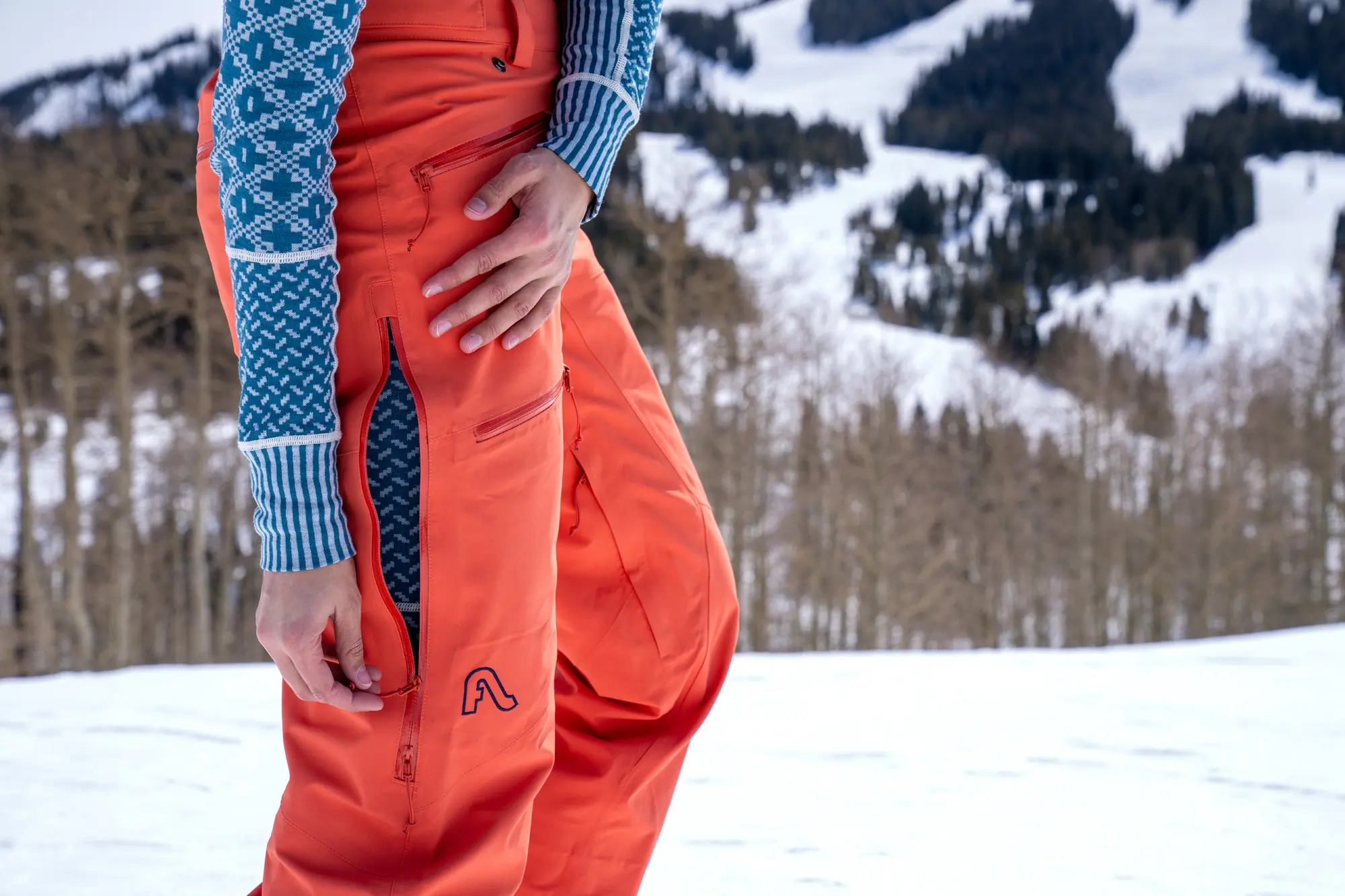



How To Wash & Dry Your Women’s Ski Pants
You might need to start washing — and machine drying — your ski pants more than you’re used to.
That’s because more brands are using ePE fabric in women’s ski pant designs.
Today’s GORE-TEX ePE fabrics are PFAS-free and more vulnerable to oils from skin, sunscreen, the ski chair, or a tasty breakfast sandwich. Meaning, the waterproof-breathable performance breaks down. The good news? It can be reactivated through simple care.
“PFAS-free DWR coatings require more frequent wash and care to maintain water repellency on face fabrics,” explained GORE-TEX expert Marshall Balick during an outdoor industry presentation Senior Editor Morgan Tilton attended in Nelson, British Columbia.
- When your ski pants stop shedding water as droplets that bead and roll off the surface, that’s the cue to wash your pants.
2. The best option is a technical wash without additives, Balick emphasized. If that isn’t on hand, a conventional, scent-free detergent without fabric softeners, like Seventh Generation, will do. Even if the only option is a scented detergent with softener, such as Tide, it’s still better to wash your jacket than skip the wash — just double-rinse. Later, follow up with a technical detergent to flush out leftover additives.
3. After cleaning, hang the ski pants to dry.
4. Once they’ve air-dried, toss the ski pants in the dryer for 20 minutes on medium heat to fully reactivate the durable water repellent (DWR).
5. If the face fabric still fails to bead water, it’s time to reapply an aftermarket treatment such as Nikwax.
6. Fair warning: These fabrics are more likely to experience oil-based stains, so be sure to wear a chef’s apron while you’re cooking breakfast.
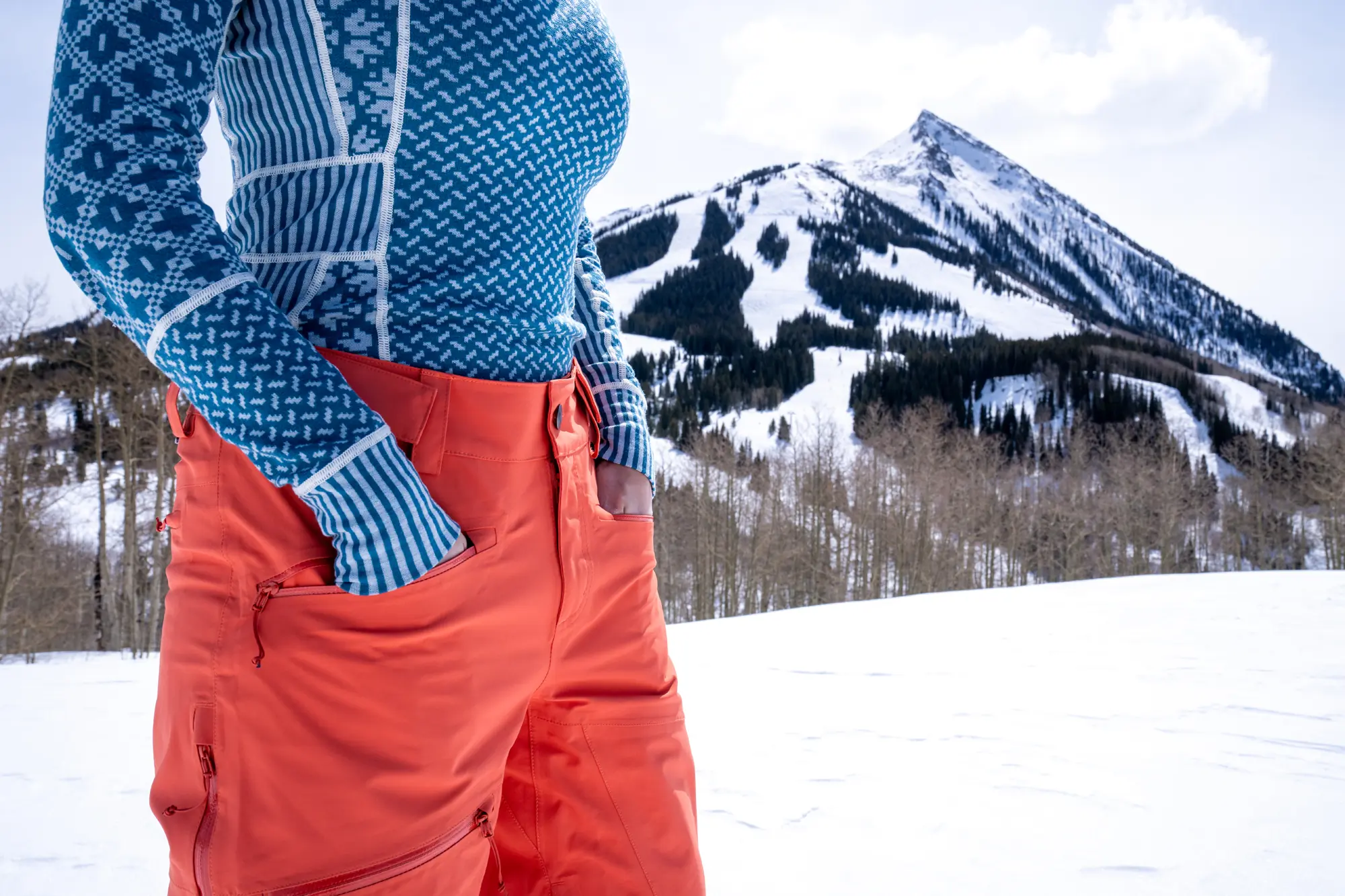



Price & Value
Depending on how often you hit the slopes, price can be a big factor. You may find that an affordable non-insulated pant like the Eddie Bauer Chair Six Pants ($229) is the way to go because you’re getting a shell pant that can do the work without breaking the bank.
But, perhaps some more technical features like a beacon pocket or a lighter weight, breathable fabric are what you’re looking for, in which case something like the Black Diamond Recon LT Pant ($350) will be worth the extra spend.
Budget
Quality snow pants with a classic, simple fit and basic waterproofness range from $120 to $250. That starter kit includes options like the North Face’s Freedom Insulated Pant ($200). Offering a bit more durability and adaptability the Eddie Bauer Chair Six Pants ($229) costs a bit more.
You’ll also find athletic, softshell designs for performance and workouts, like the La Sportiva Excelsior Pant ($179).
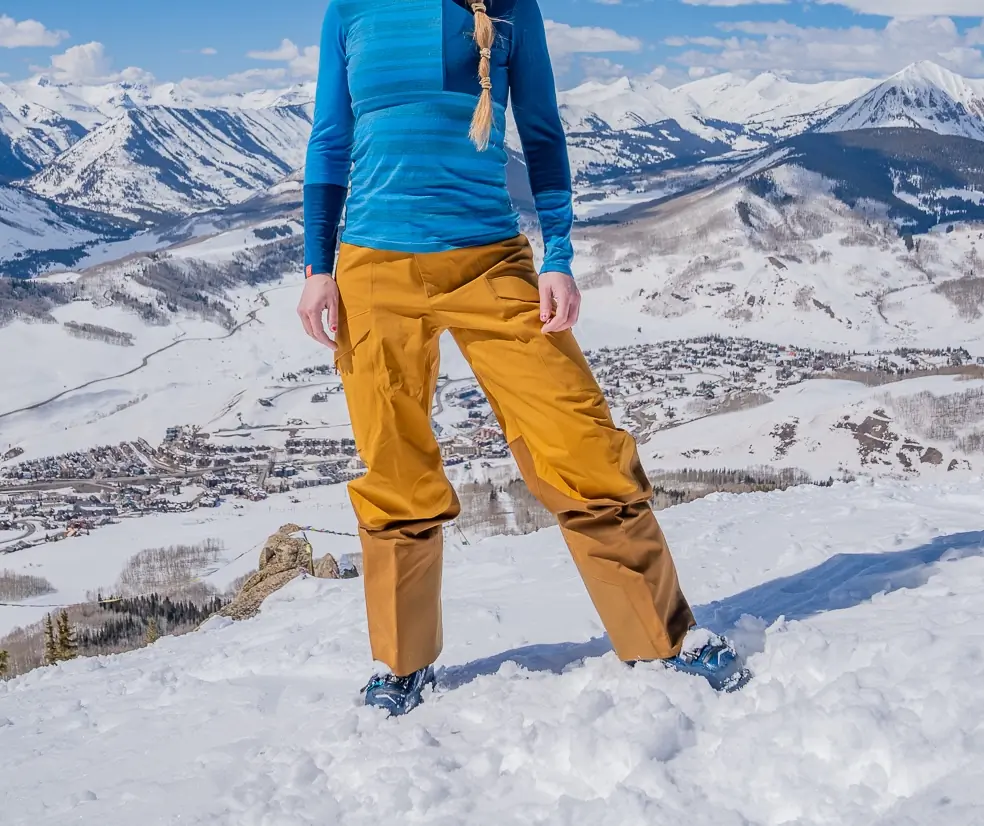



Mid-Tier
Next, you’ll see higher quality snow pants that are more robust for weekend warriors of the ski area, like the Flylow Faye Insulated Pant ($350) and the Helly Hansen Women’s Powderqueen Ski Pants ($300). These pants offer a bit more style, articulation, and robustness, as well as additional pockets, RECCO reflectors, lightweight insulation, and excellent stretch.
Typically, these pants are made with more sustainable materials like a PFC-free DWR finish. Some of these designs are good hybrid options for the resort and backcountry, but we don’t recommend wearing an insulated pair of ski pants while touring.
Premium
Pulling out all the stops, the most premium ski pants are constructed for backcountry, mountaineering, and the stormiest bell-to-bell resort days. These ski pants look incredible, feel incredible, and last season after season. Take the Arc’teryx Sentinel Pant ($600), which has benchmarks of superior design, protection, fit, feel, and long-lasting quality, and uses the new PFAS-free GORE-TEX ePE membrane.


Frequently Asked Questions
If you’re new to the sport, pick a pair that is budget-friendly: $250 or less. If you have a ski pass and plan to ski throughout the season or in different locations and climates, it’s worth investing in a pair with more waterproofness and comfort: $300 or more. If you are already a committed skier and will hit the slopes in all conditions, or you’re a backcountry skier, consider investing in a premium pair of pants around $500.


Non-insulated ski pants are a protective fabric that can be waterproof and windproof. Insulated ski pants are the same, but are made with insulation for warmth. The insulation can be synthetic or down — but usually it’s a synthetic fill — and can be targeted in different areas of the pant (like the upper thighs and glutes). Each pant can also have various quantities of insulation, so some pants are warmer than others.
Insulated ski pants are great for sitting on cold, long, or snowy lift rides, as well as waiting in the lift line when it’s freezing and gusty out. If the temps drop into the teens and wind picks up, we prefer insulated ski pants.
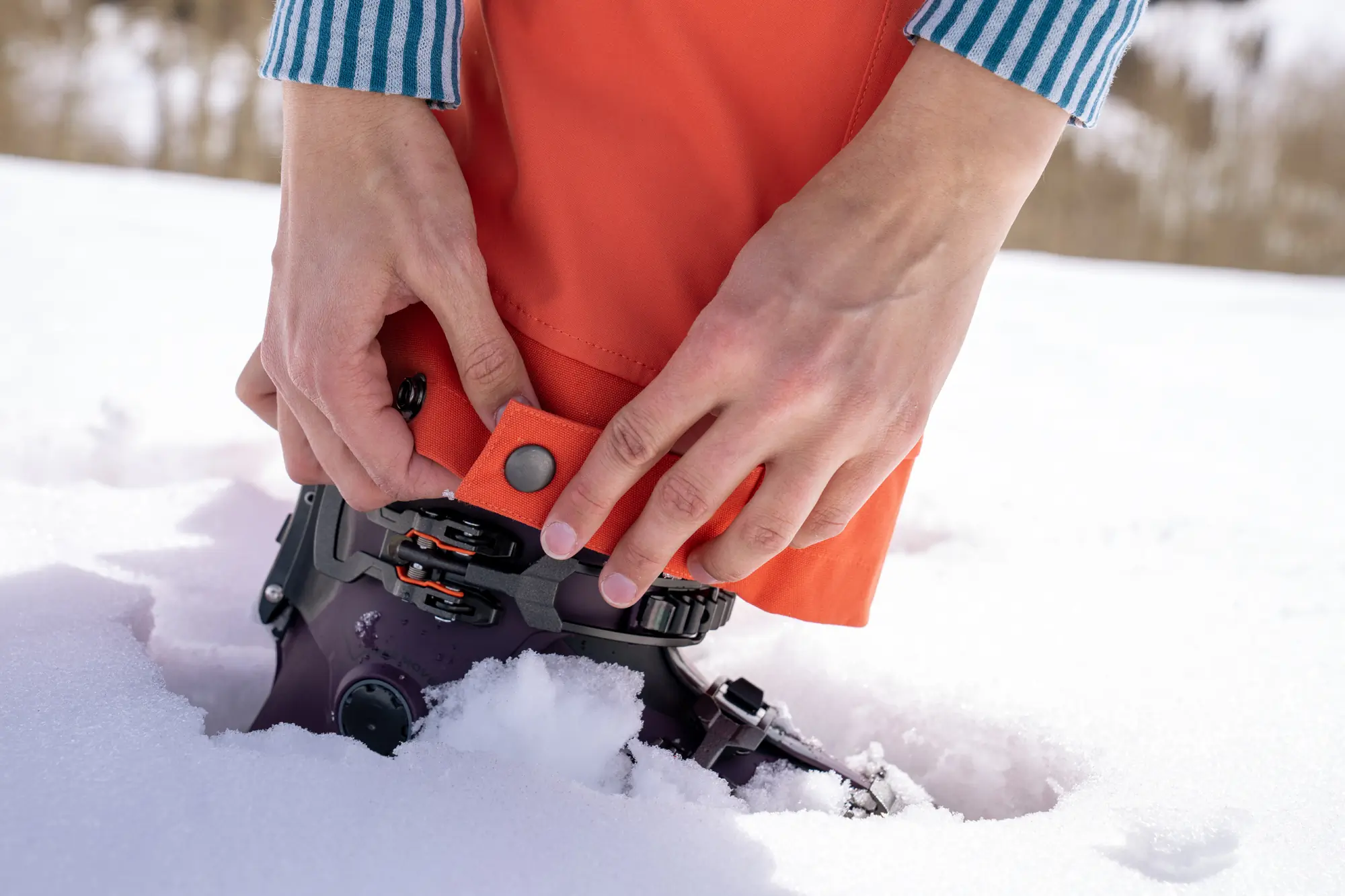



RECCO is an avalanche safety system used by ski teams and rescue professionals to help find people buried in an avalanche. The system includes a small metal reflector plate sewn into outerwear apparel to help a buried skier be detected under the snow. A RECCO reflector doesn’t transmit any signals or need any batteries. To locate the reflector, the RECCO detector transmits an active signal, with a range up to 120 m through the air and 10-20 m through snow.
A RECCO reflector does not replace an avalanche transceiver, also known as an avalanche beacon. If you plan to go into the sidecountry (slackcountry) such as out the boundary gate at your local ski area, or into the backcountry, be sure to wear and know how to use your avalanche transceiver. Likewise, be sure that your ski partners wear and know how to use their avalanche transceiver.
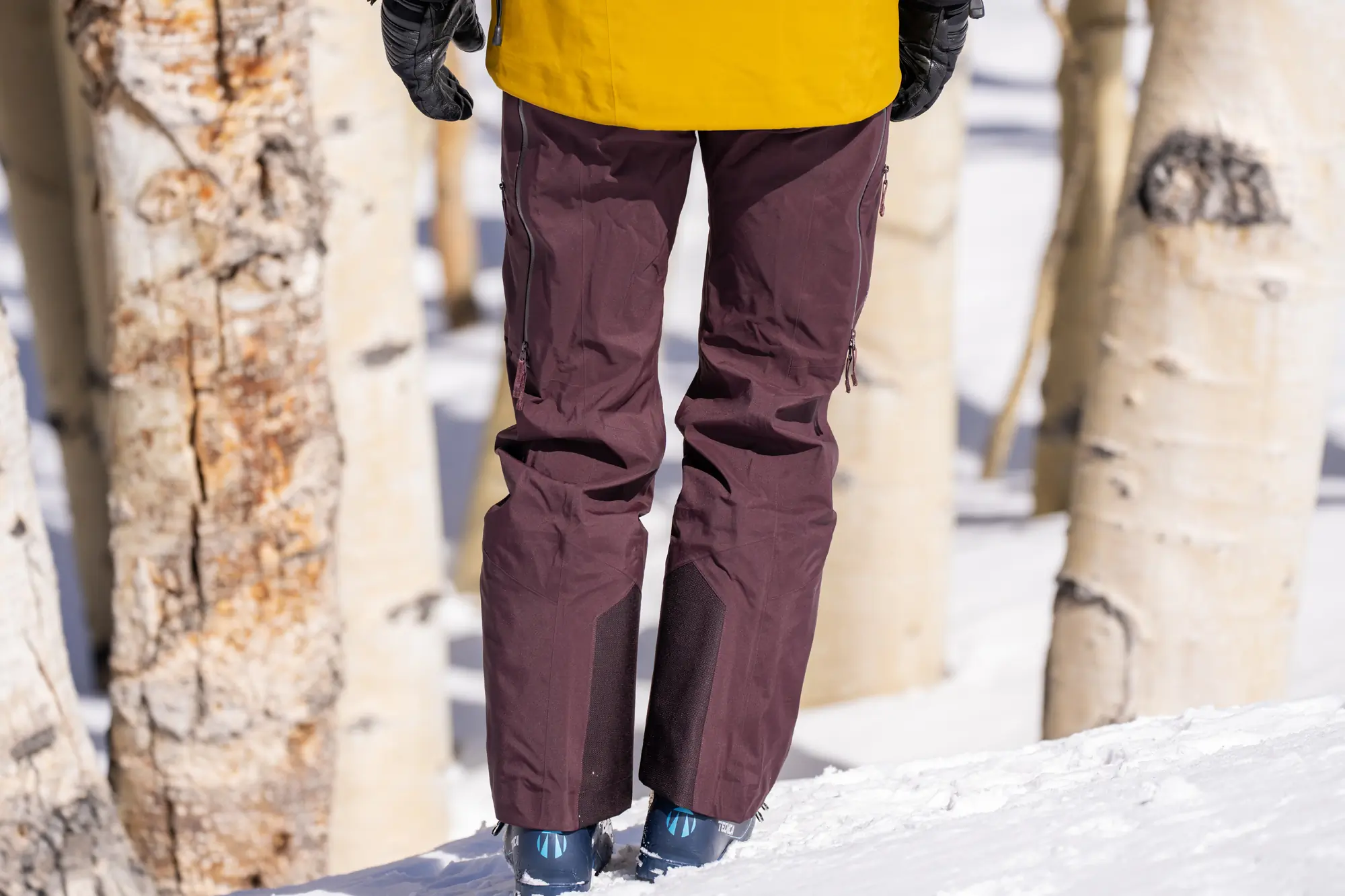



Ski pants shouldn’t be so tight that they restrict movement, but should not so loose that there’s extra space between the pants and your body (you’ll get cold more easily plus the fabric will feel too cumbersome or potentially get caught). If you wear thicker or more bottom baselayers, consider sizing up to ensure that the pants fit properly.
With women’s ski pants, it’s super important to check the size charts for the waist and length dimensions. Some brands offer short, tall, petite, and plus or extended sizes to accommodate more bodies.
Stylistically, a freeride cut provides a baggier fit while a performance-oriented pant is slimmer and more form-following for cardio activity.
GORE-TEX is a waterproof, windproof breathable membrane that is part of the fabric. For a long time, GORE-TEX has been the gold standard in waterproofing. However, there are a few similar apparel membranes out there. Some brands have their own version of waterproof-breathable fabrics.
Whichever ski pants you buy, make sure they are waterproof or at a minimum water resistant. Fabrics have varying levels of waterproofing, from 5,000mm to 10,000mm to 25,000mm water column ratings. Get a pair with at least a 10,000-15,000mm waterproofness for ski areas like Keystone and for a snowier climate, like Crested Butte, go for a 20,000mm rating.
A higher waterproofness sacrifices the breathability. For resort skiing, it’s OK to sacrifice some breathability for the sake of waterproofness if you plan to be out in a blizzard. But if you’re hiking in-bounds terrain, traversing runs, backcountry skiing, or generally work up a sweat while linking moguls and weaving trees or eating pow runs, you’ll want breathability in your pants.
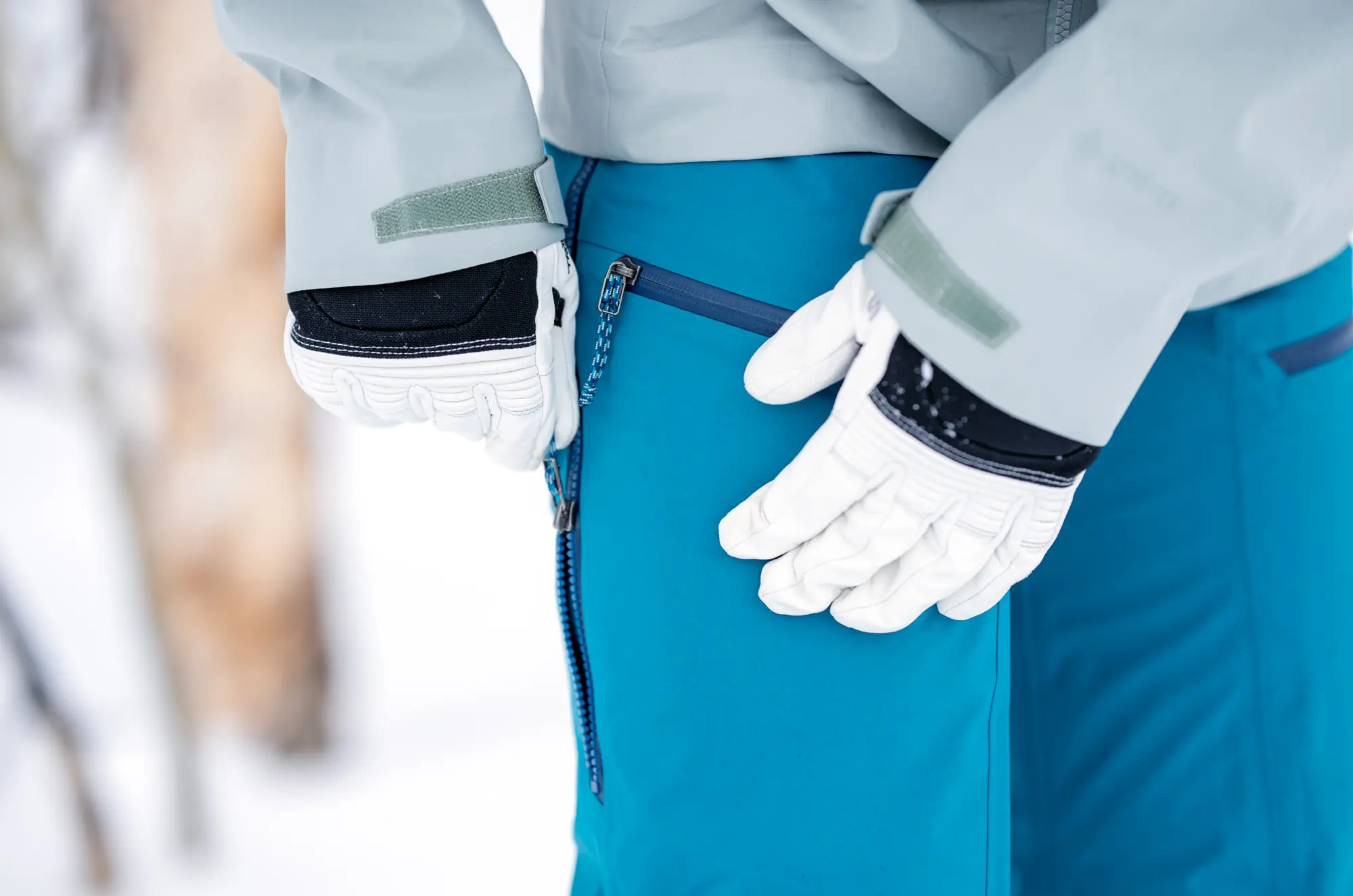



Typically, backcountry skiers wear an avalanche transceiver (a.k.a. beacon) in the manufacturer’s approved and included chest harness. The harness system is designed to protect the display, prevent accidental mode switching, and release the system while keeping the beacon attached to the person. A harness offers a bit of padding and keeps the beacon on the body and close to the airway.
The pocket method can be tempting, because it can feel more comfortable, depending on your layering system. It can potentially enable quicker access if you need to go into search mode, because you don’t need to unzip your jacket. To that end, many brands are explicitly or non-explicitly designing beacon-specific pockets in snow bibs or snow pants. While there’s no established industry guideline, you want to be sure that a beacon-advertised pocket is internal (versus external), so it’s fully sewn in and integrated into the pant. There should be a secure zipper. And there needs to be an internal attachment point, like an integrated clip, to attach your beacon’s tether.
You don’t want to put your beacon in the pocket of your ski jacket, which could be ripped off in an avalanche (technically, so could ski pants) or stuffed in your ski pack mid-climb.
Skiing uphill demands more breathability from your ski pants than resort skiing. For that, we tend to prefer something that allows for better temperature regulation. Softshell pants allow us to exert ourselves while going uphill without overheating, so they’re nice for a workout at the resort, but they don’t offer as much waterproof protection and durability as other 3-layer fabrics.
Our favorite backcountry ski pants include the Rab Women’s Khroma Diffuse GORE-TEX Pants, which are extremely waterproof at 28K and offer a very breathable rating of Ret<9. Built for the backcountry, the Black Diamond Recon LT Pant boasts waterproofness and breathability of 20K / 20K. Both of those pants function well in-bounds, too.
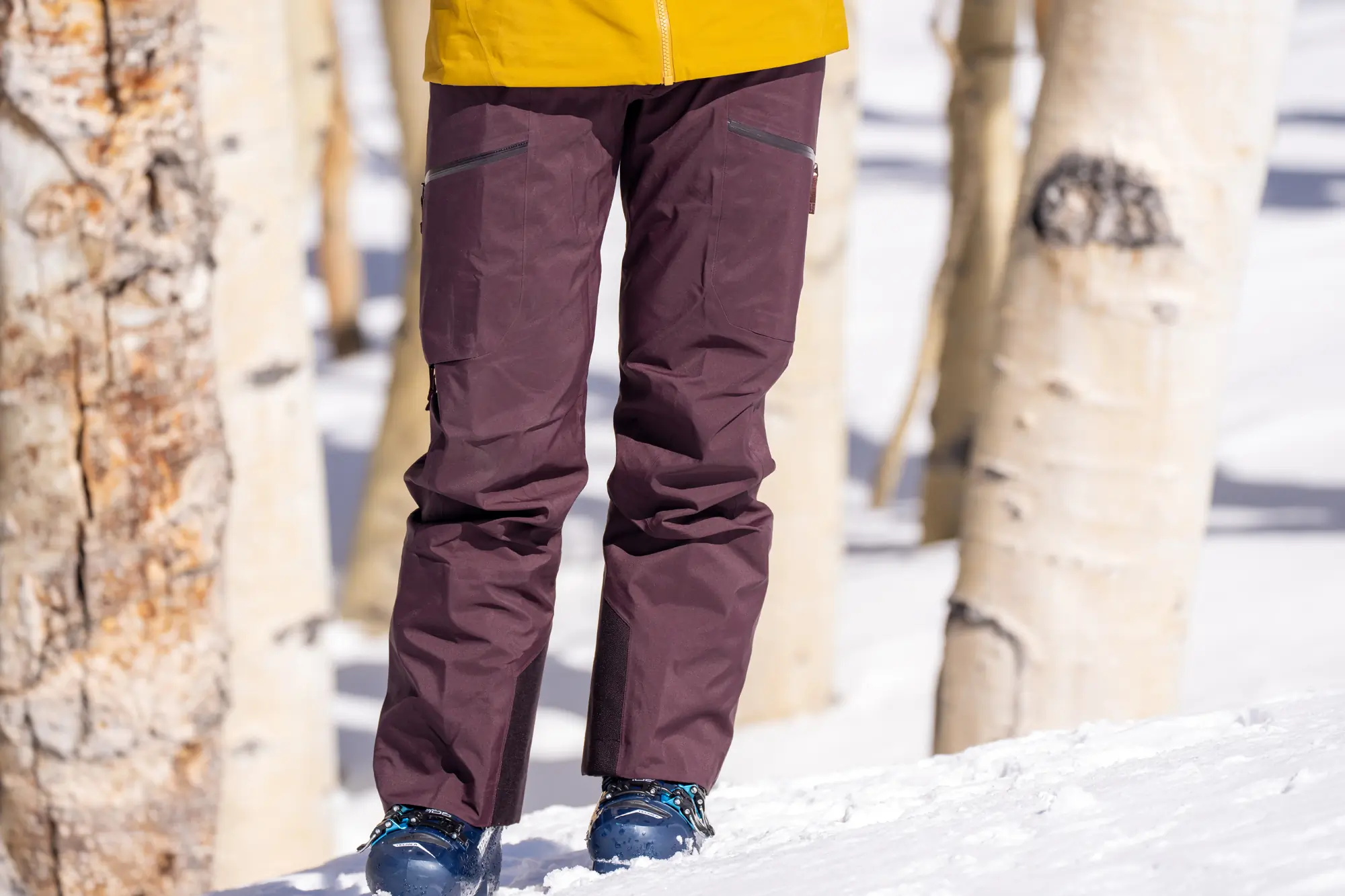



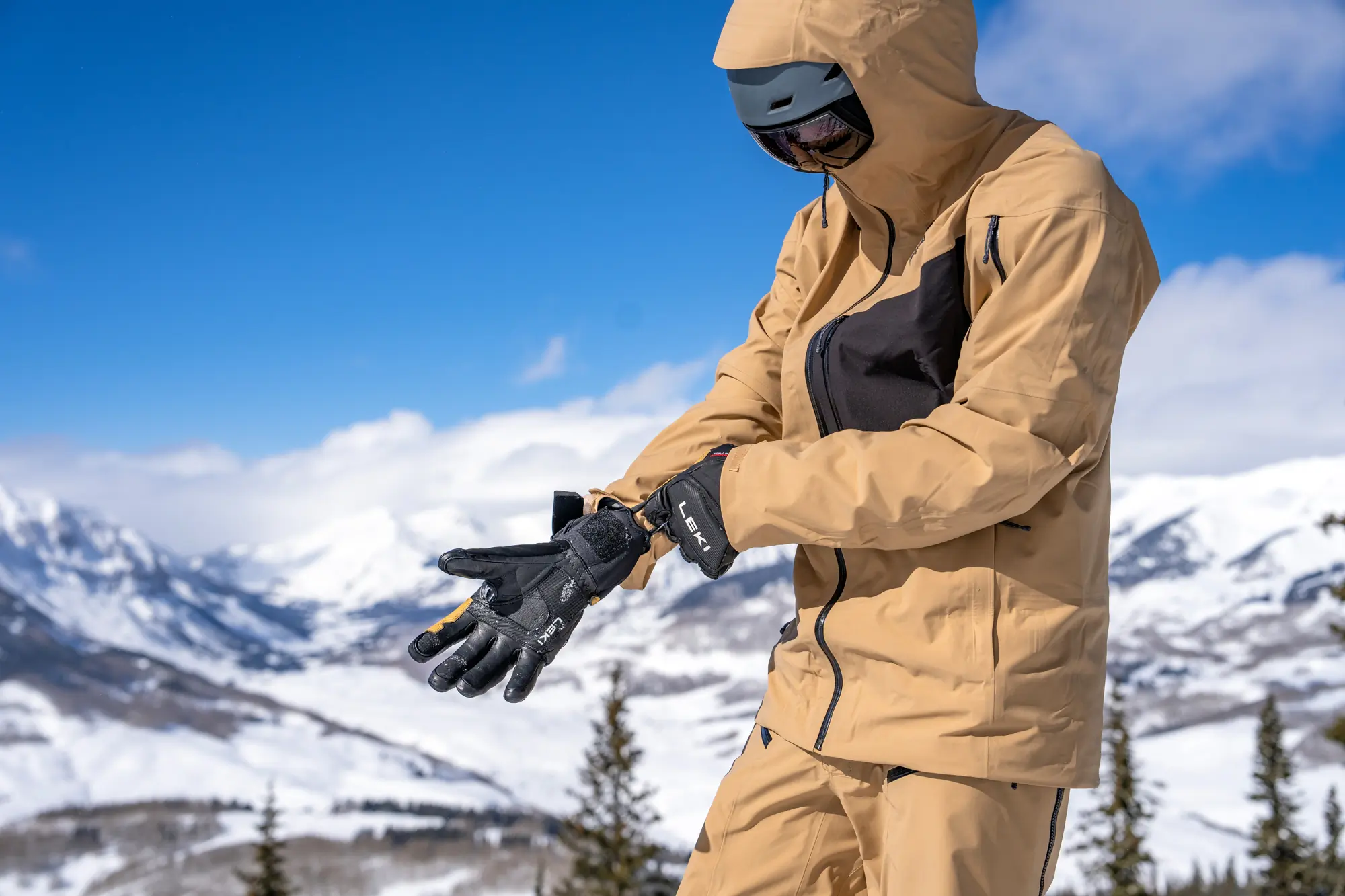

For the resort or backcountry, we’ve got your digits covered with the best field-tested ski gloves from Swany, Flylow, Black Diamond, and more.


Our experts tested and found the best ski helmets including Smith, Pret, Giro and more. Whether you’re carving at the resort or in the backcountry, your dome is protected with these options.
Read the full article here




